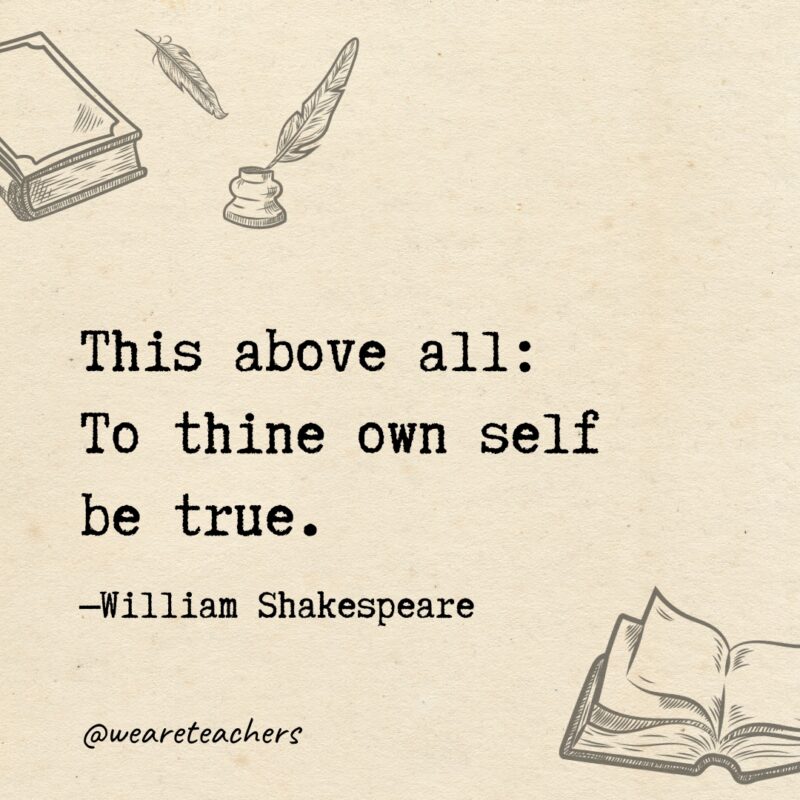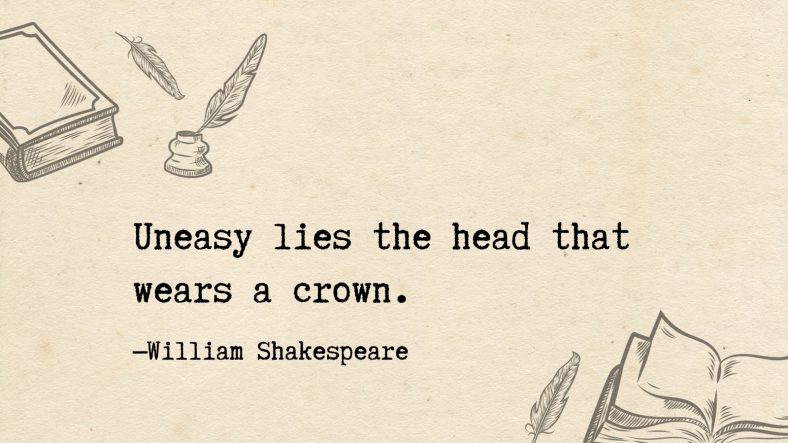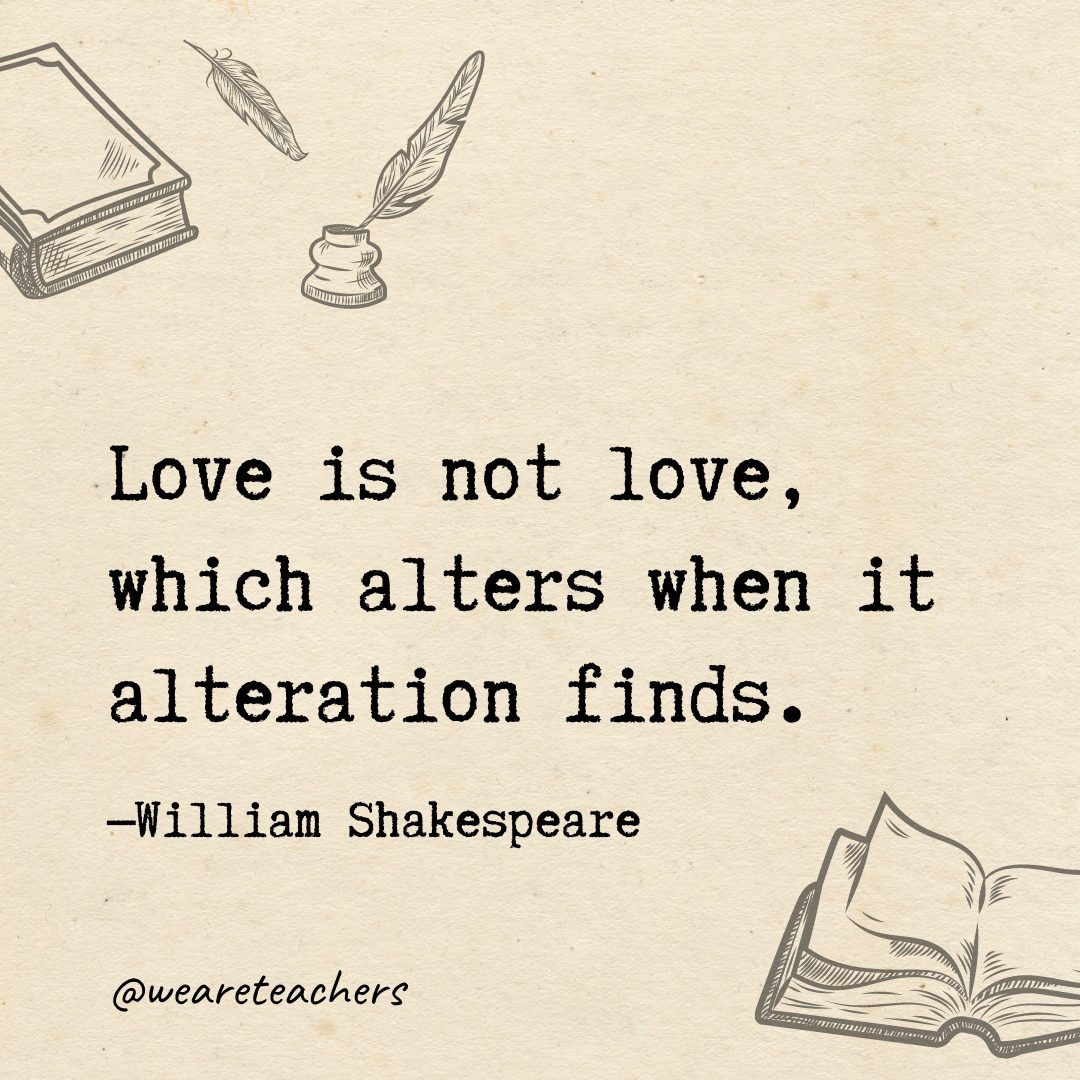Romeo and Juliet. Macbeth. Othello. These are just a few of the beloved classic tales penned by William Shakespeare that continue to be discovered by new generations. Many quotes by Shakespeare are still relevant in our modern society, which is a sign that the poet was ahead of his time. Here’s a list of our favorite quotes by Shakespeare to share with your students.
Quick reminder: Shakespeare wrote about love, betrayal, and many adult themes in his works. Every classroom is different, so be sure to thoroughly read through these quotes by Shakespeare before sharing them with students.
Our Favorite Quotes by Shakespeare
One touch of nature makes the whole world kin. —Troilus and Cressida – Act 3, scene 3, line 181.
We know what we are but know not what we may be. —Hamlet – Act 4, scene 5, lines 48-49.

No legacy is so rich as honesty. —All’s Well That Ends Well – Act 3, scene 5, line 13.

Give every man thy ear, but few thy voice. —Hamlet – Act 1, scene 3, line 74.

Be not afraid of greatness. Some are born great, some achieve greatness, and some have greatness thrust upon ’em. —Twelfth Night – Act 2, scene 5, lines 148-150.

Sweet are the uses of adversity, which, like the toad, ugly and venomous, wears yet a precious jewel in his head. —As You Like It – Act 2, scene 1, lines 12-14.
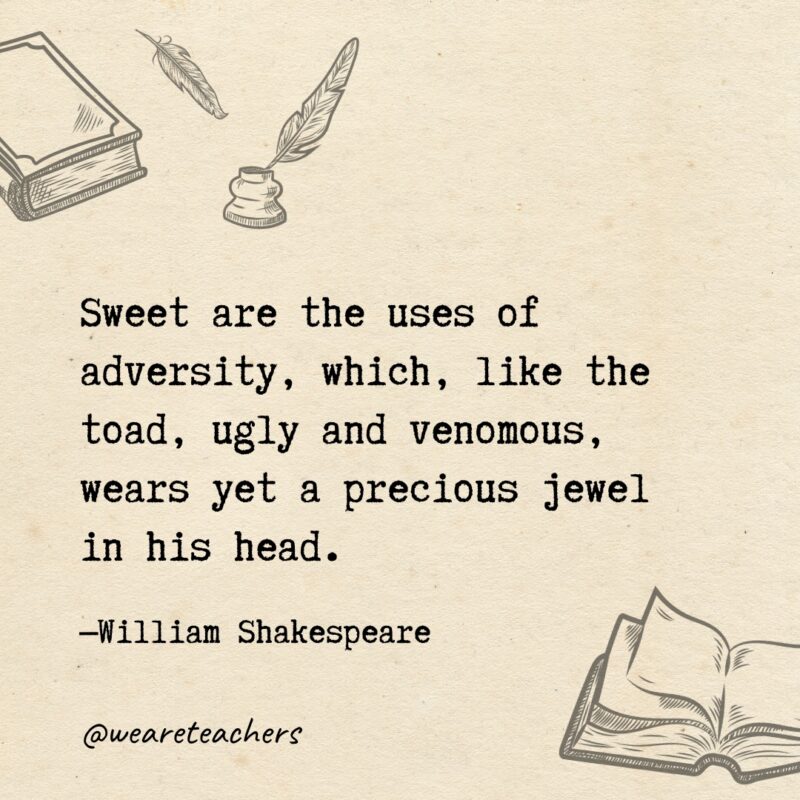
Uneasy lies the head that wears a crown. —Henry IV – Part 2, Act 3, scene 1, line 31.
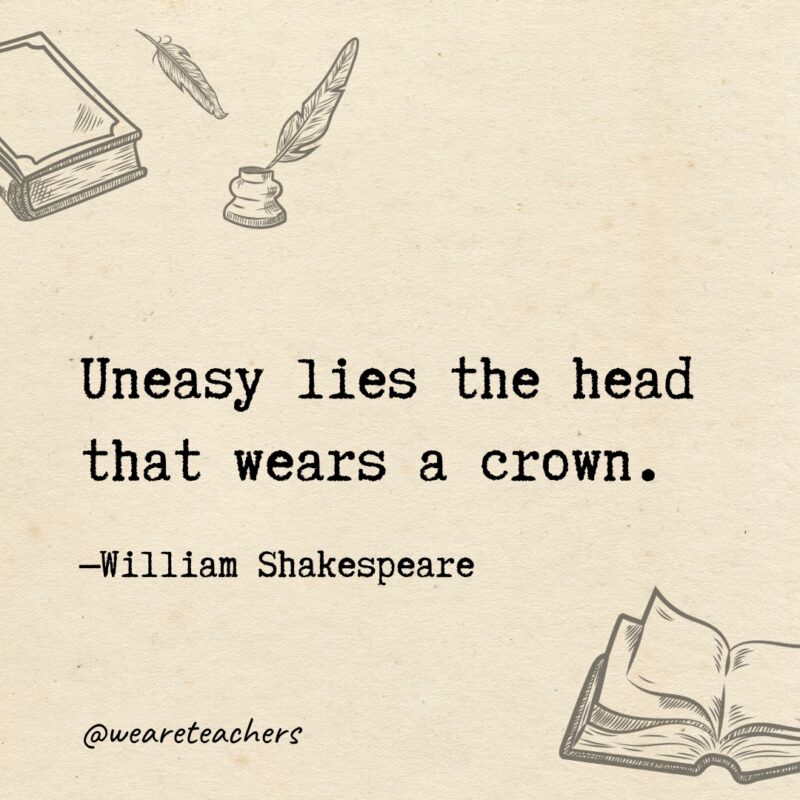
Nothing will come of nothing. —King Lear – Act 1, scene 1, line 99.
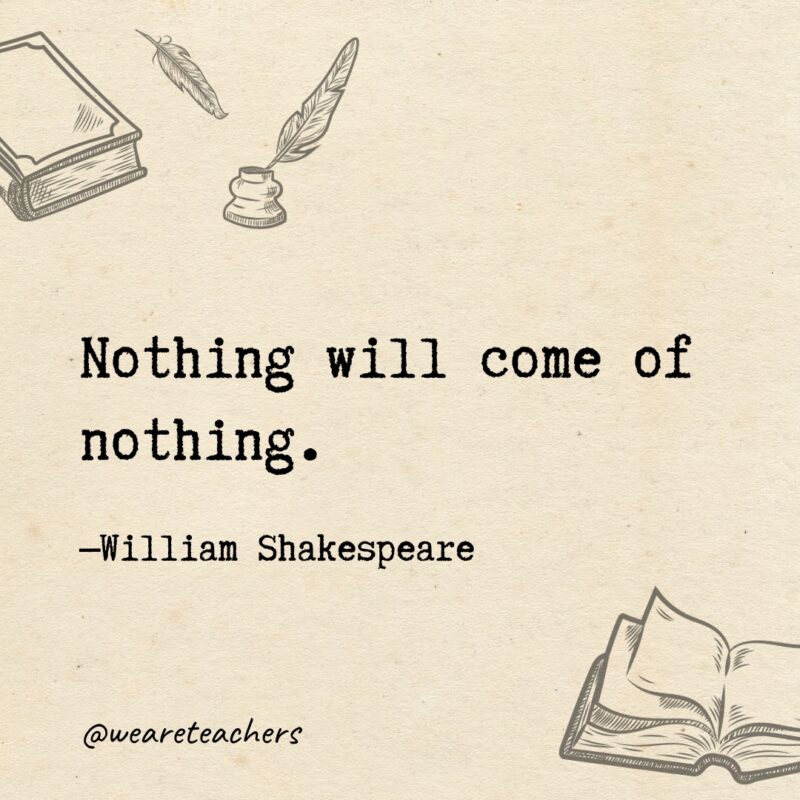
Our doubts are traitors and make us lose the good we oft might win by fearing to attempt. —Measure for Measure – Act 1, scene 4, lines 85-87.

How poor are they that have not patience! What wound did ever heal but by degrees? —Othello – Act 2, scene 3, lines 391-392.

Though she be but little, she is fierce. —A Midsummer Night’s Dream – Act 3, scene 2, line 342.

How far that little candle throws his beams! So shines a good deed in a naughty world. —The Merchant of Venice – Act 5, scene 1, lines 99-100.

The robbed that smiles steals something from the thief. —Othello – Act 1, scene 3, lines 238-239.

What’s done cannot be undone. —Macbeth – Act 5, scene 1, line 71.

Sweet mercy is nobility’s true badge. —Titus Andronicus – Act 1, scene 1, line 119.

I wasted time, and now doth time waste me. —Richard II – Act 5, scene 5, line 50.

Small cheer and great welcome makes a merry feast. —The Comedy of Errors – Act 3, scene 1, lines 33-34.

Heat not a furnace for your foe so hot that it do singe yourself. —Henry VIII – Act 1, scene 1, lines 168-169.

What’s past is prologue. —The Tempest – Act 2, scene 1, line 289.
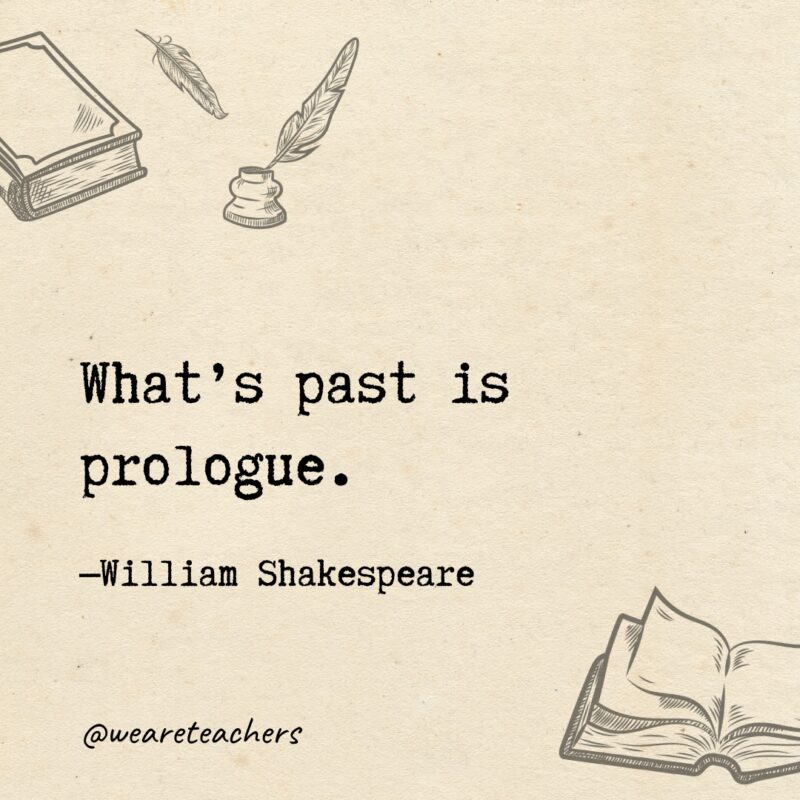
In time we hate that which we often fear. —Antony and Cleopatra – Act 1, scene 3, line 14.

Ambition should be made of sterner stuff. —Julius Caesar – Act 3, scene 2, line 101.

’Tis not enough to help the feeble up, but to support him after. —Timon of Athens – Act 1, scene 1, lines 125-126.

Neither a borrower nor a lender be. —Hamlet – Act 1, scene 3, line 81.

With mirth and laughter let old wrinkles come. —The Merchant of Venice – Act 1, scene 1, line 85.

I bear a charmed life. —Macbeth – Act 5, scene 8, line 15.

Modest doubt is called the beacon of the wise. —Troilus and Cressida – Act 2, scene 2, lines 15-16.

And ’tis a kind of good deed to say well. And yet words are no deeds. —Henry VIII – Act 3, scene 2, lines 196-197.

Where words are scarce, they are seldom spent in vain. —Richard II – Act 2, scene 1, lines 7-8.

Boldness be my friend. —Cymbeline – Act 1, scene 6, line 21.

All the world’s a stage, and all the men and women merely players. They have their exits and their entrances; and one man in his time plays many parts. —As You Like It – Act 2, scene 7, lines 146-149.

Words without thoughts never to heaven go. —Hamlet – Act 3, scene 3, line 103.

Wisely and slow. They stumble that run fast. —Romeo and Juliet – Act 2, scene 3, line 101.

Pleasure and action make the hours seem short. —Othello – Act 2, scene 3, line 400.

To be or not to be—that is the question. —Hamlet – Act 3, scene 1, line 64.

All that glisters is not gold. —The Merchant of Venice – Act 2, scene 7, line 73.

And oftentimes excusing of a fault doth make the fault the worse by the excuse. —King John – Act 4, scene 2, lines 30-31.

Such as we are made of, such we be. —Twelfth Night – Act 2, scene 2, line 32.

The fault … is not in our stars but in ourselves. —Julius Caesar – Act 1, scene 2, lines 147-148.

Brevity is the soul of wit. —Hamlet – Act 2, scene 2, line 97.
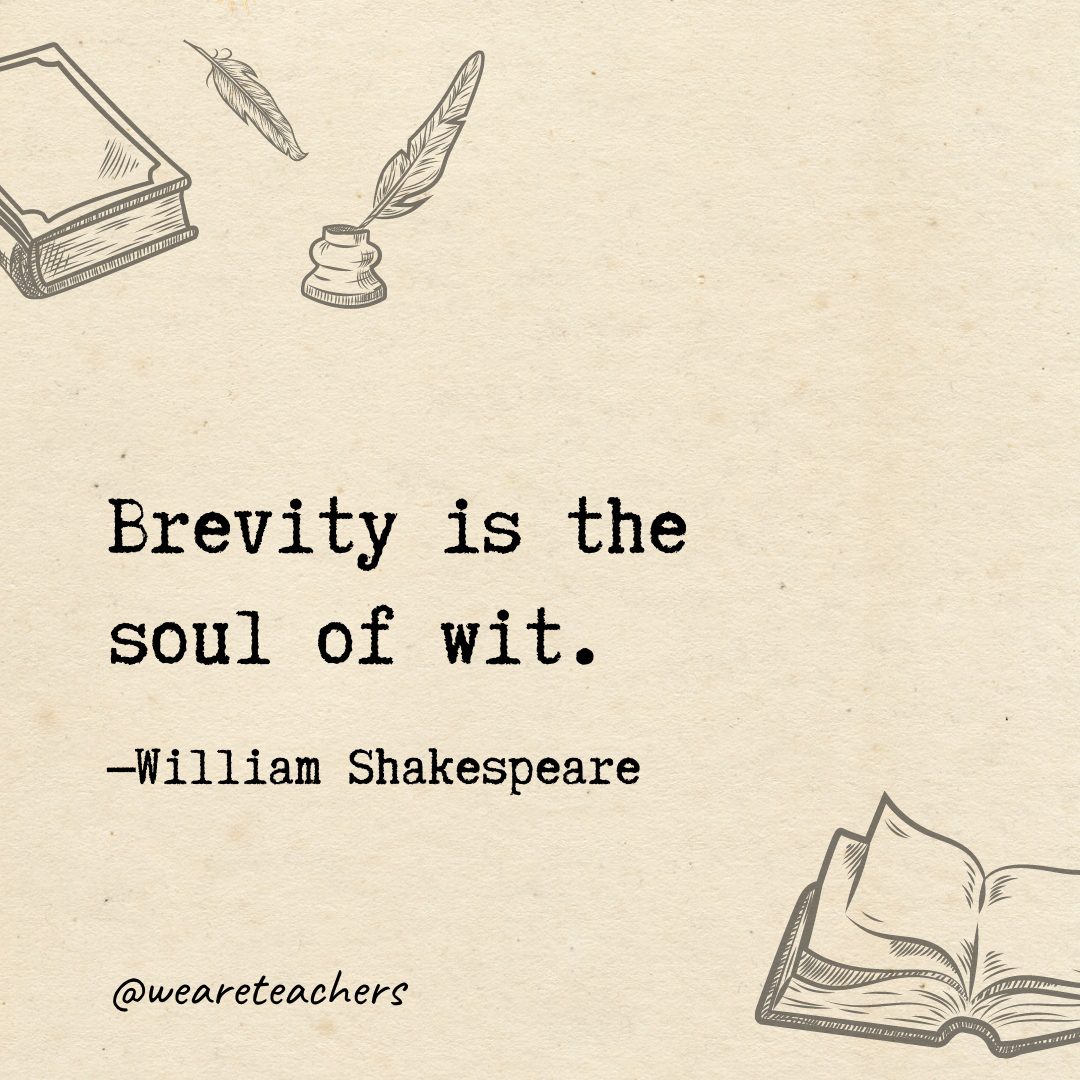
And this, our life, exempt from public haunt, finds tongues in trees, books in the running brooks, sermons in stones, and good in everything. —As You Like It – Act 2, scene 1, lines 15-17.
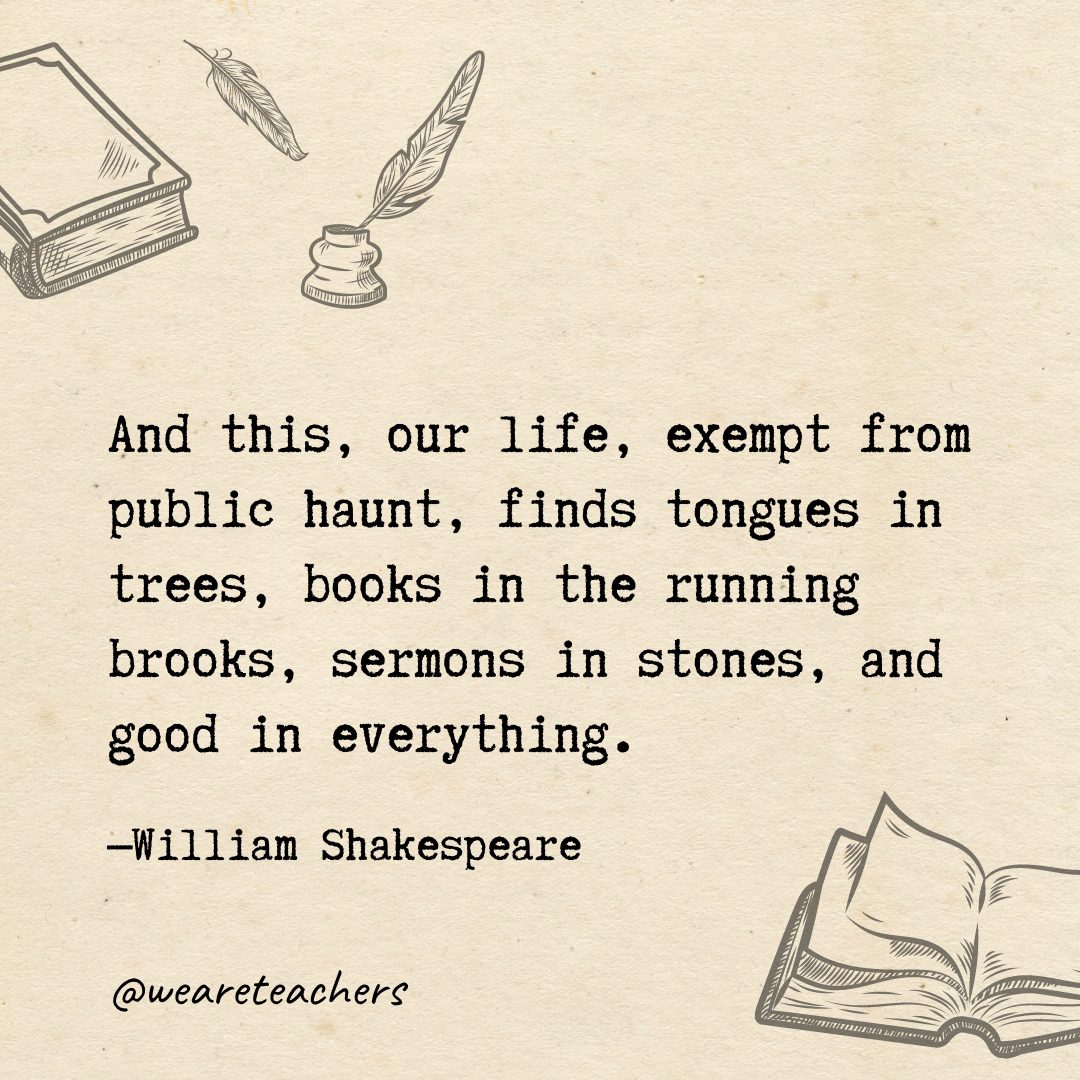
Life’s but a walking shadow, a poor player that struts and frets his hour upon the stage and then is heard no more. It is a tale told by an idiot, full of sound and fury, signifying nothing. —Macbeth – Act 5, scene 5, lines 27-29.
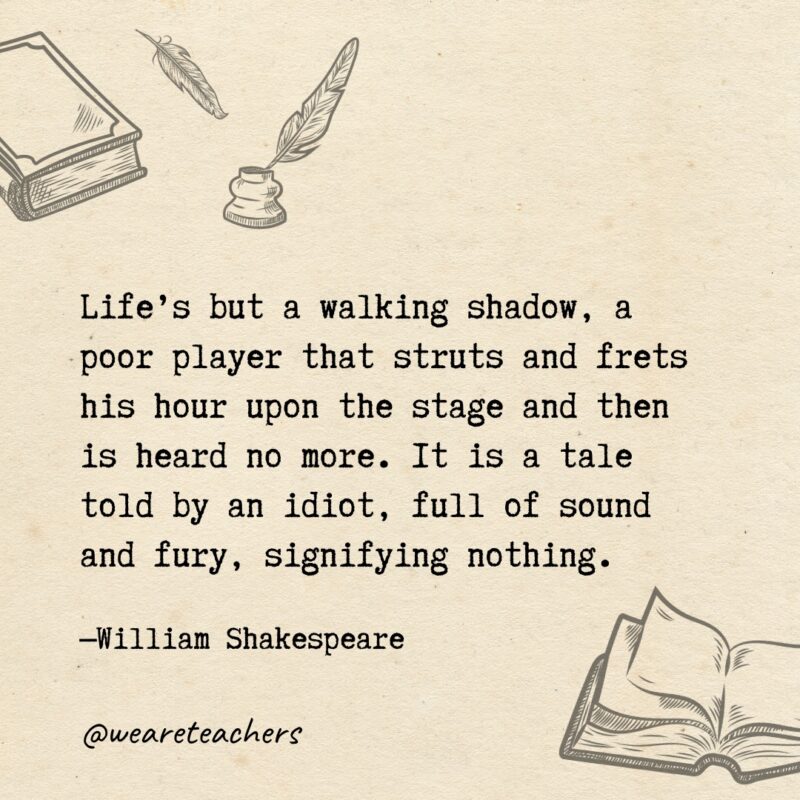
I like this place and willingly could waste my time in it. —As You Like It – Act 2, scene 4, lines 97-98.

Give sorrow words. The grief that does not speak
whispers the o’erfraught heart and bids it break. —Macbeth – Act 4, scene 3, lines 246-247.
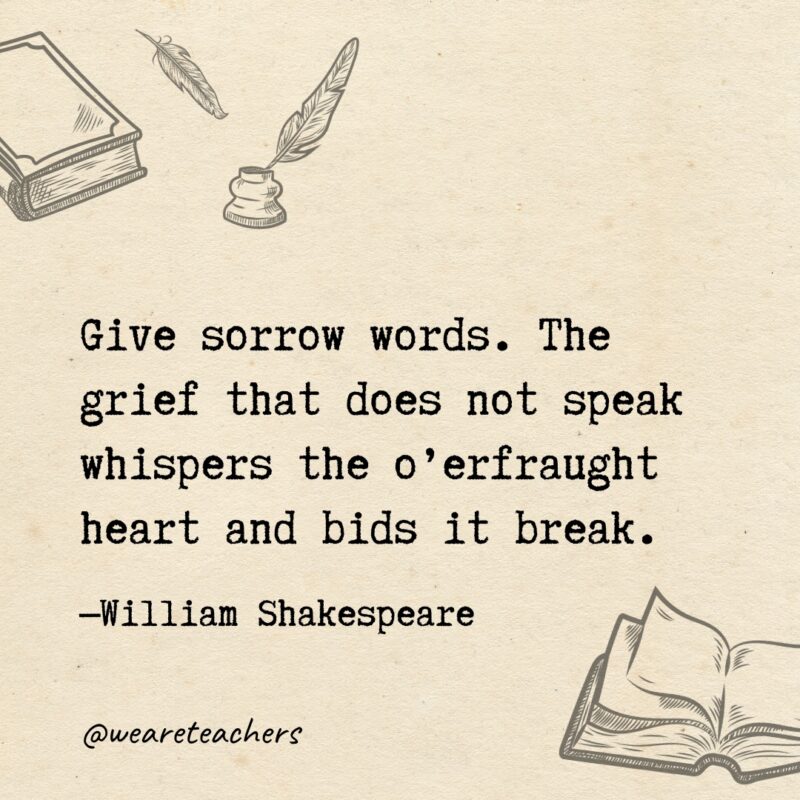
Better three hours too soon than a minute too late. —The Merry Wives of Windsor – Act 2, scene 2, lines 319-320.
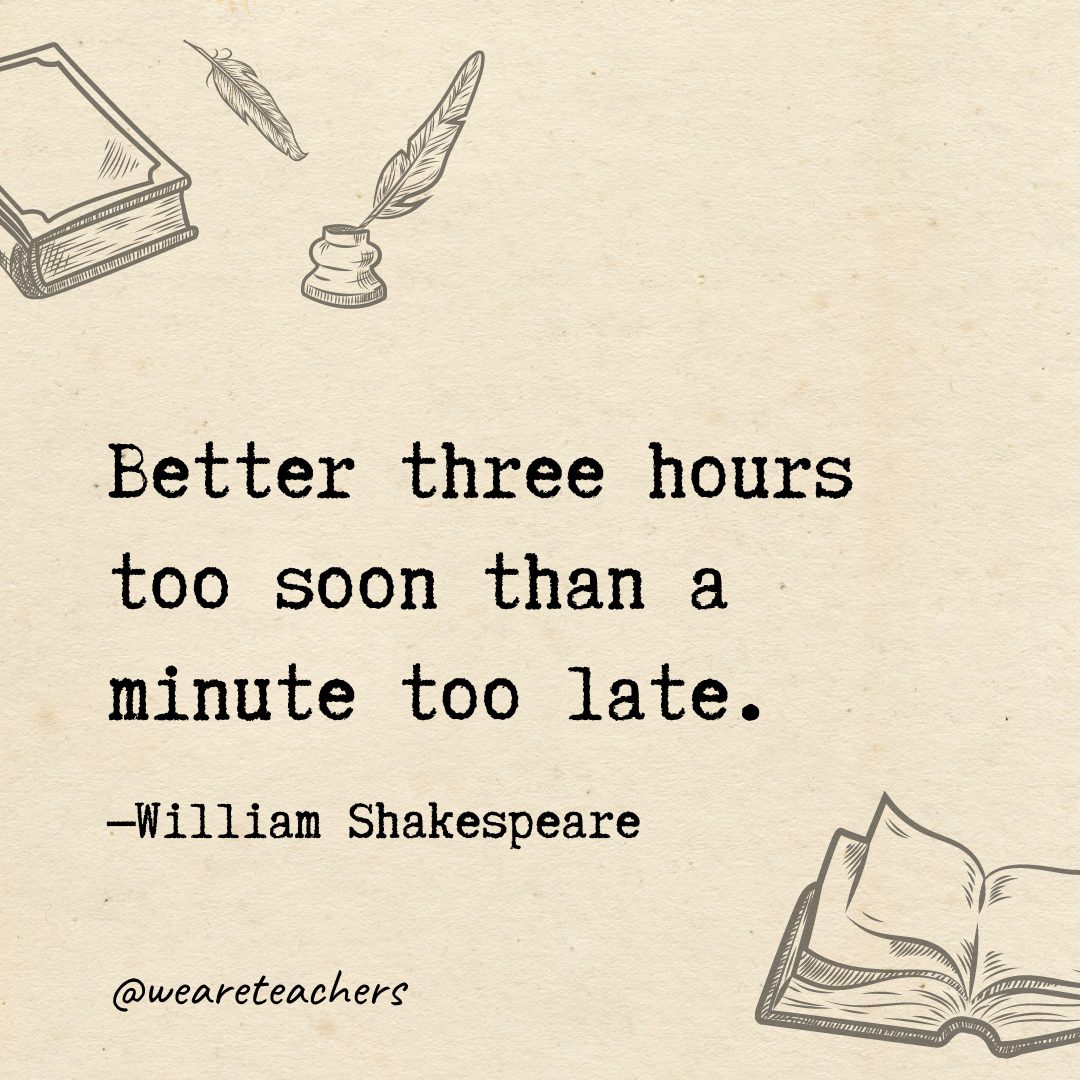
Look like th’ innocent flower, but be the serpent under ’t. —Macbeth – Act 1, scene 5, lines 76-77.
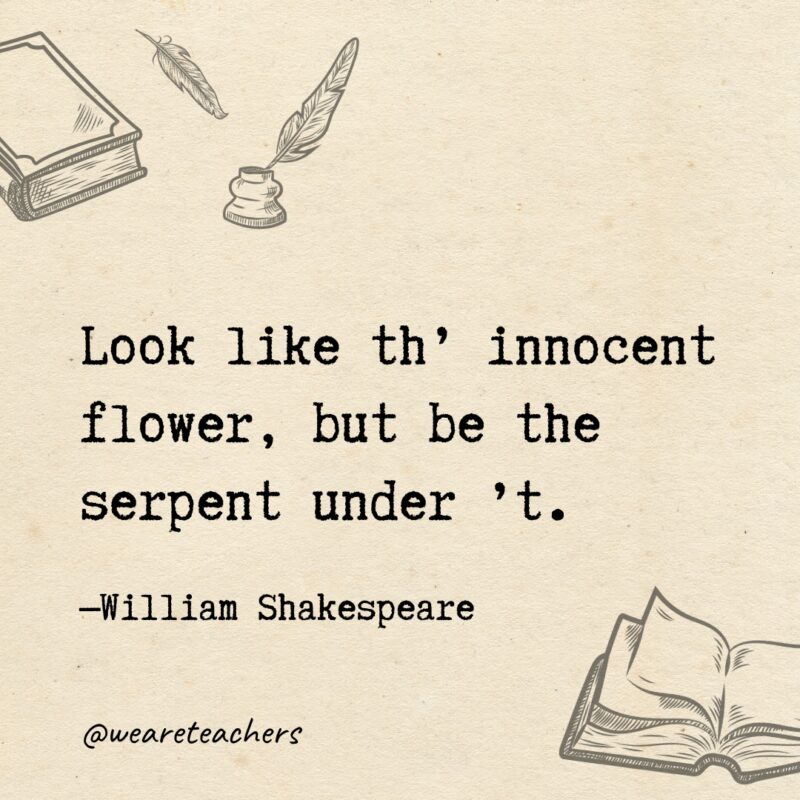
My tongue will tell the anger of my heart, or else my heart, concealing it, will break. —The Taming of the Shrew – Act 4, scene 3, lines 82-83.

Et tu, Brute? —Julius Caesar – Act 3, scene 1, line 85.
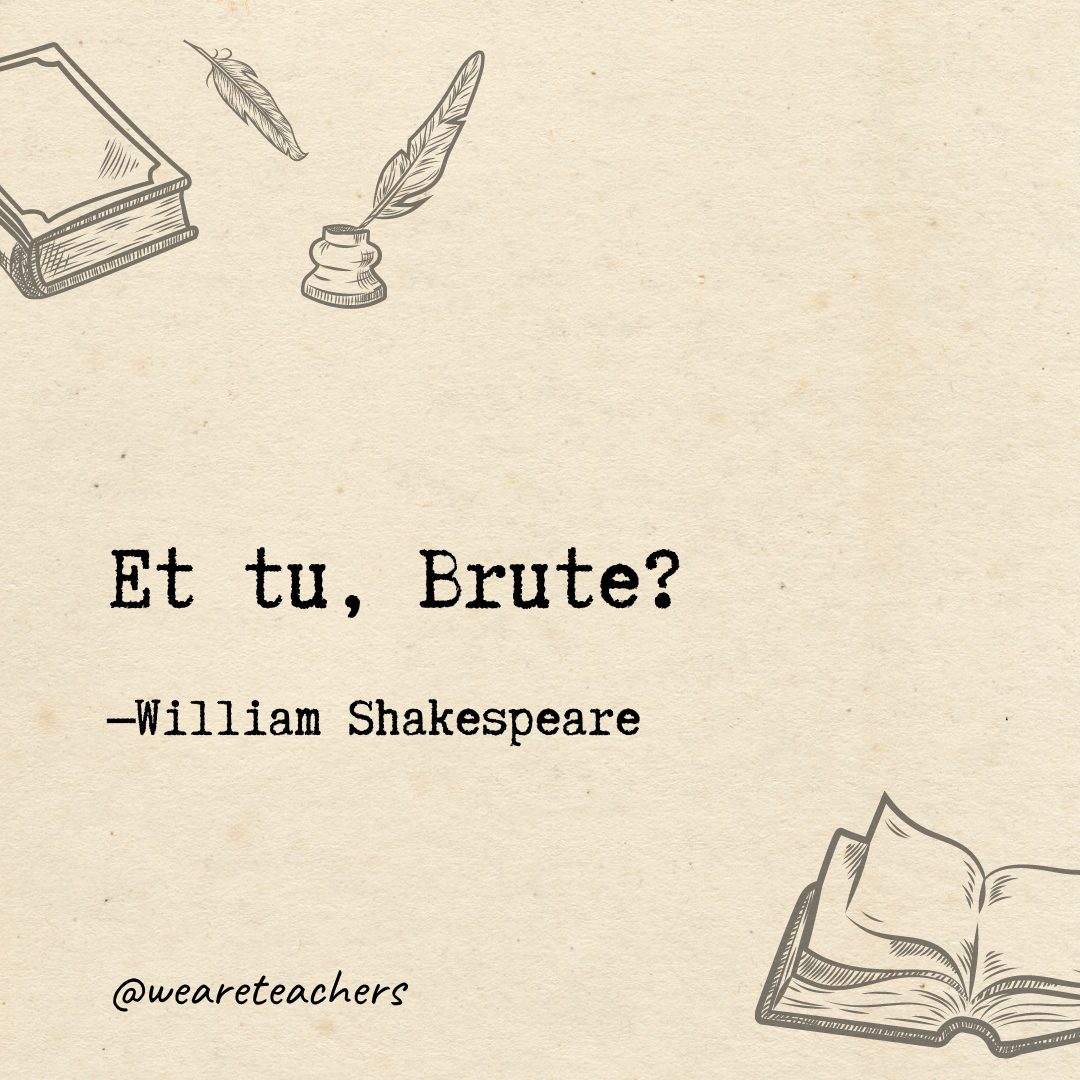
That one may smile and smile and be a villain. —Hamlet – Act 1, scene 5, line 115.

Let me be that I am and seek not to alter me. —Much Ado About Nothing – Act 1, scene 3, lines 34-35.
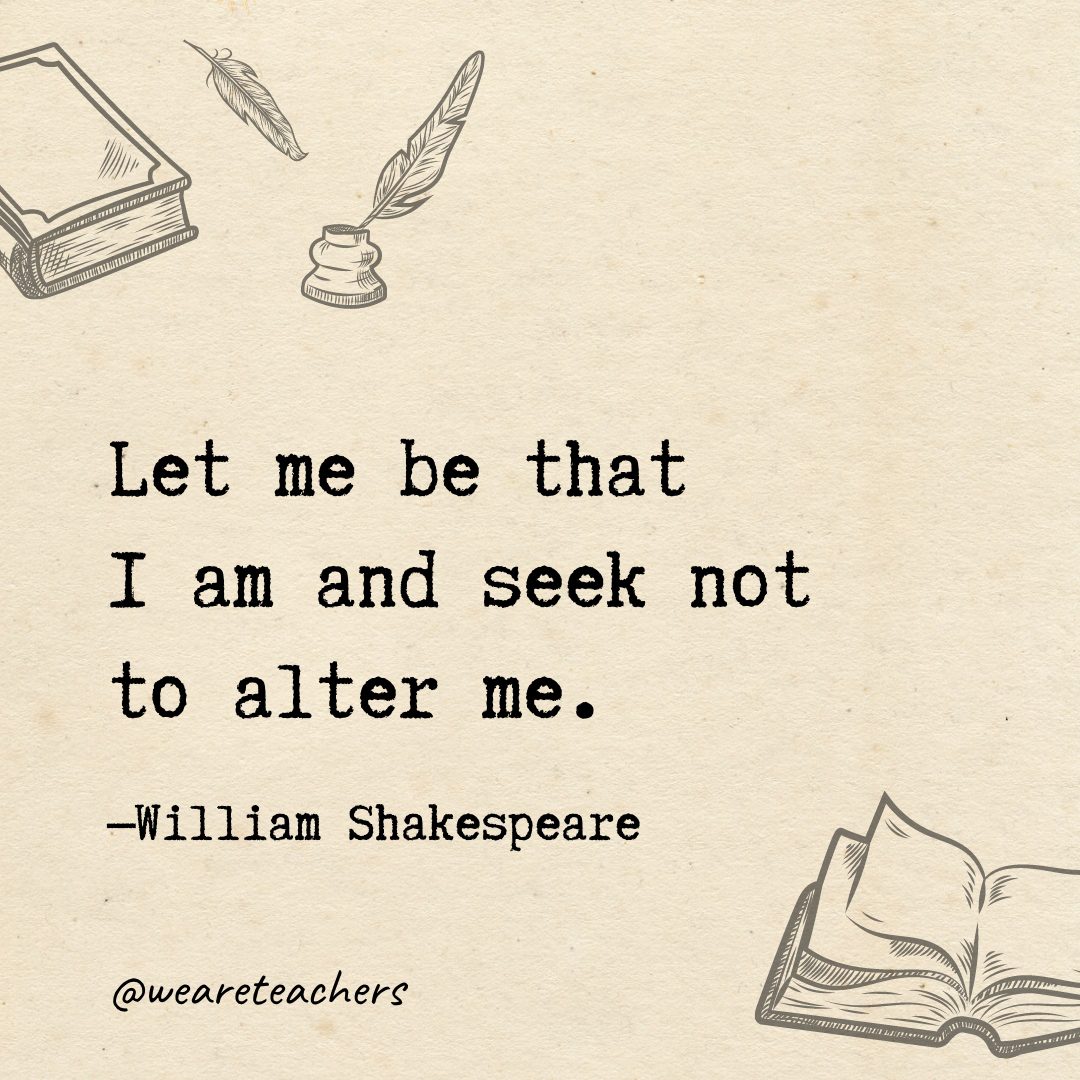
Suspicion always haunts the guilty mind. —Henry VI – Part 3, Act 5, scene 6, line 11.
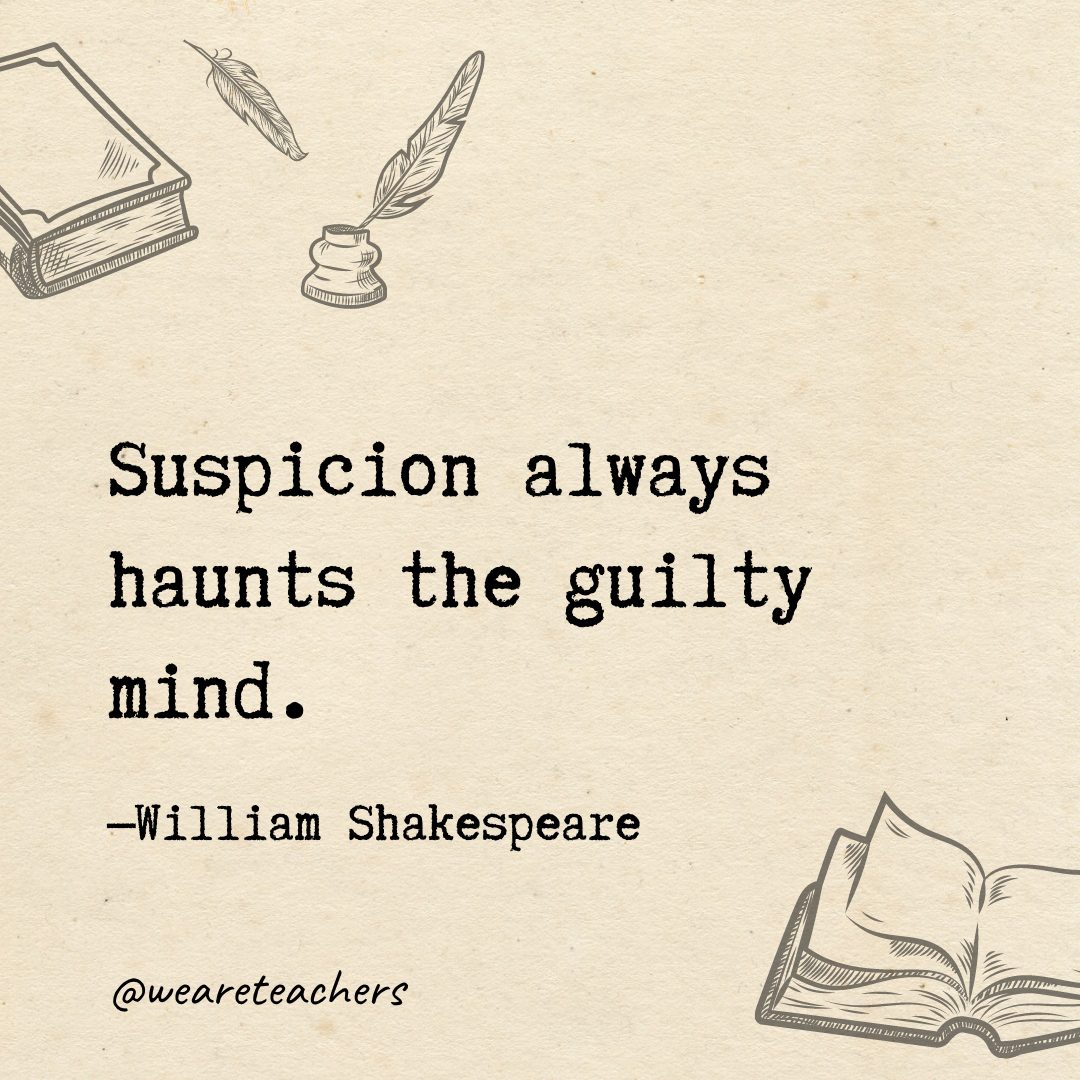
Conscience does make cowards of us all. —Hamlet Act 3, scene 1, line 91.

O, beware, my lord, of jealousy! It is the green-eyed monster which doth mock the meat it feeds on. —Othello – Act 3, scene 3, lines 195-197.
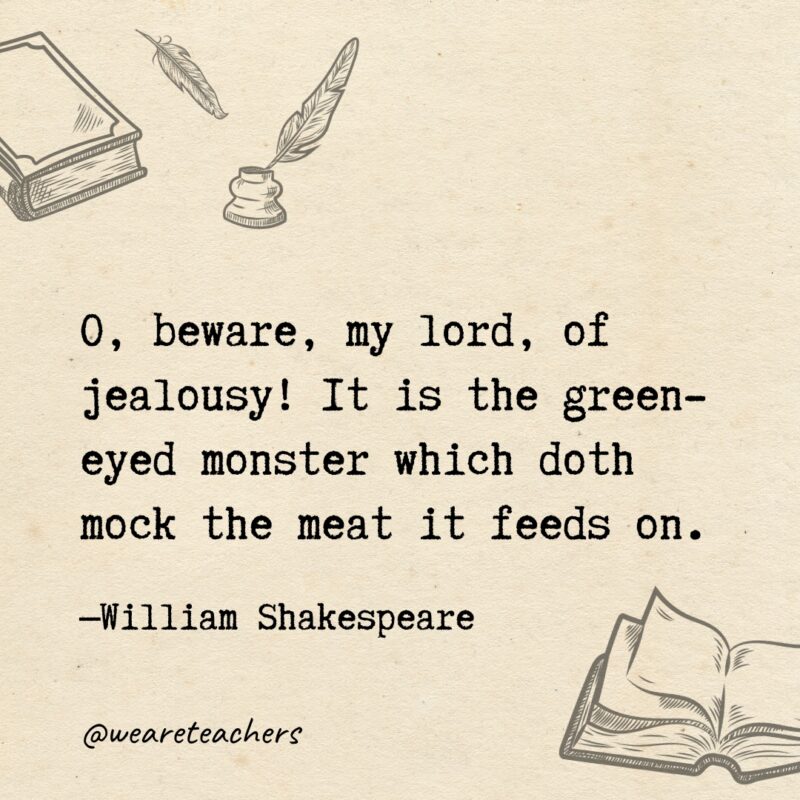
Be great in act, as you have been in thought. —King John – Act 5, scene 1, line 46.

April … hath put a spirit of youth in everything. —Sonnet 98, lines 2-3.
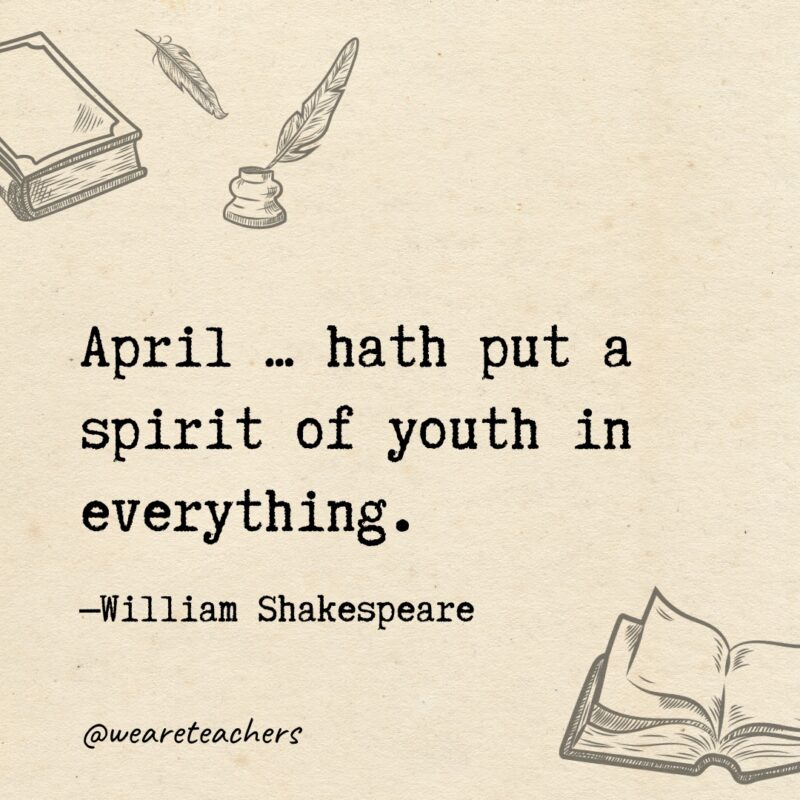
All things are ready if our minds be so. —Henry V – Act 4, scene 3, line 73.

The tempter or the tempted, who sins most? —Measure for Measure – Act 2, scene 2, line 200.

For sweetest things turn sourest by their deeds; lilies that fester smell far worse than weeds. —Sonnet 94, lines 13-14.
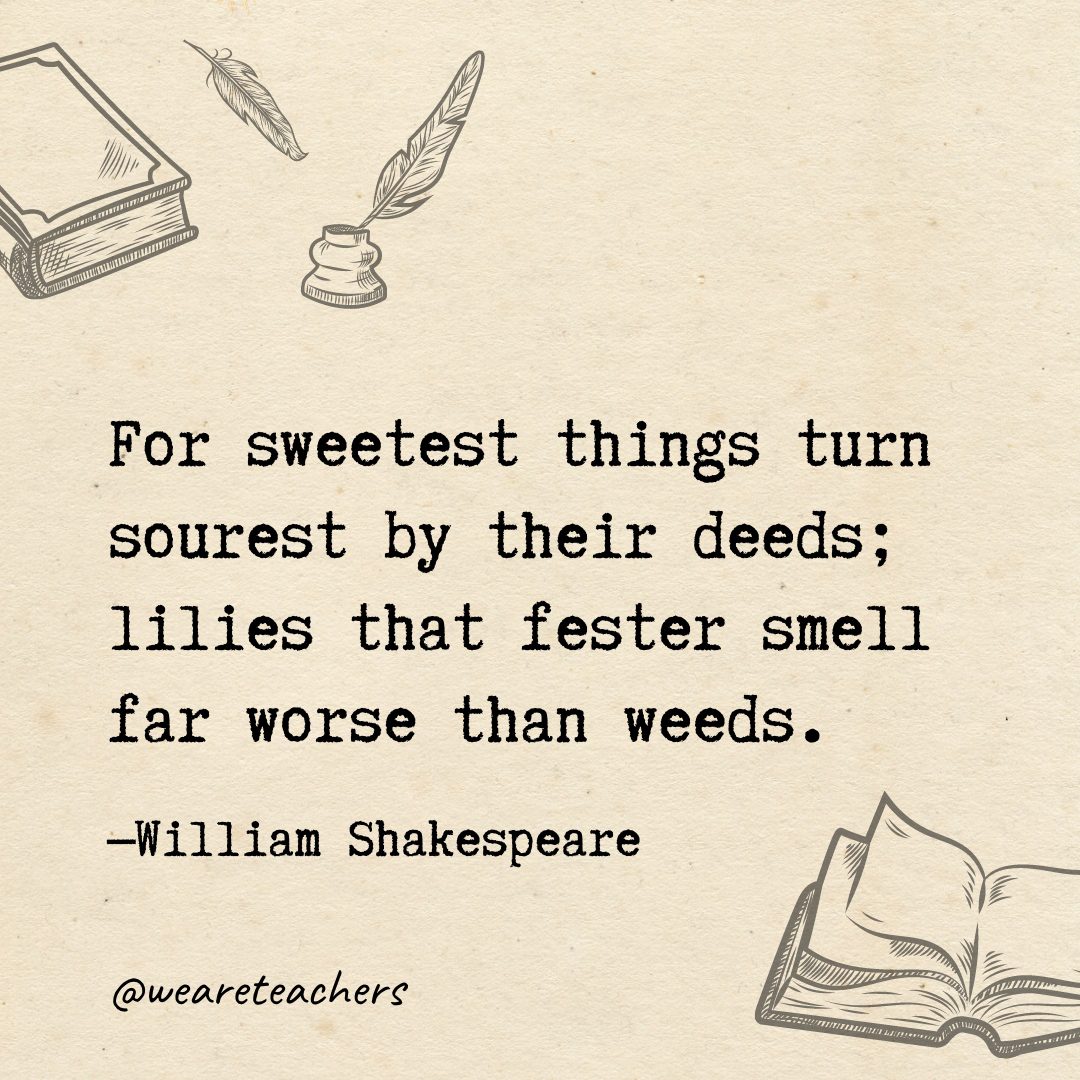
Thought is free. —Twelfth Night – Act 1, scene 3, line 68.

I would not wish any companion in the world but you. —The Tempest, Act 3, scene 1, lines 65-66.

Summer’s lease hath all too short a date. —Sonnet 18, line 4.

He jests at scars that never felt a wound. —Romeo and Juliet – Act 2, scene 2, line 1.

Our bodies are our gardens to which our wills are gardeners. —Othello – Act 1, scene 3, lines 362-363.
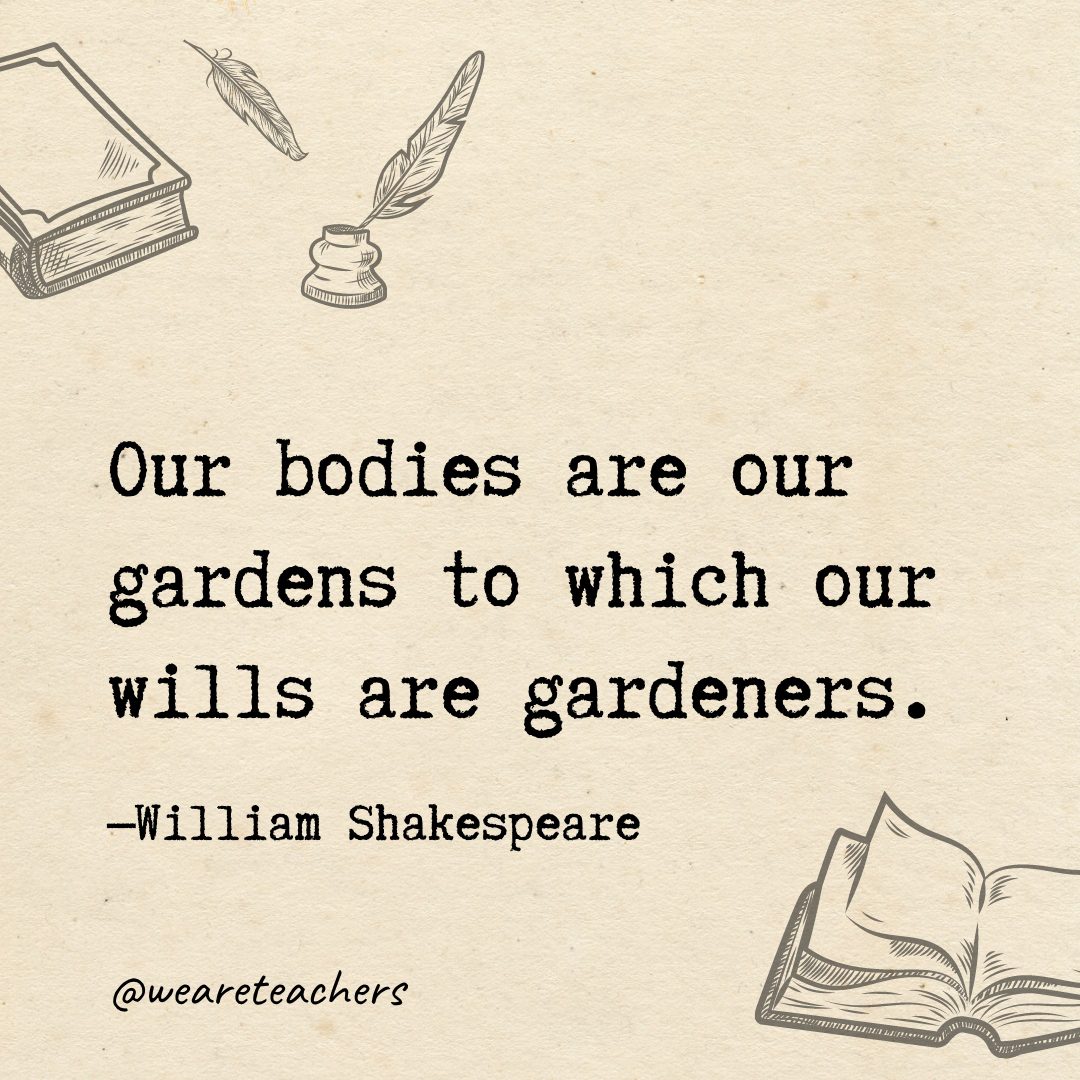
Men should be what they seem. —Othello – Act 3, scene 3, line 147.

They do not love that do not show their love. —The Two Gentlemen of Verona – Act 1, scene 2, line 31.

She sat like Patience on a monument, smiling at grief. Was not this love indeed? —Twelfth Night – Act 2, scene 4, lines 126-127.
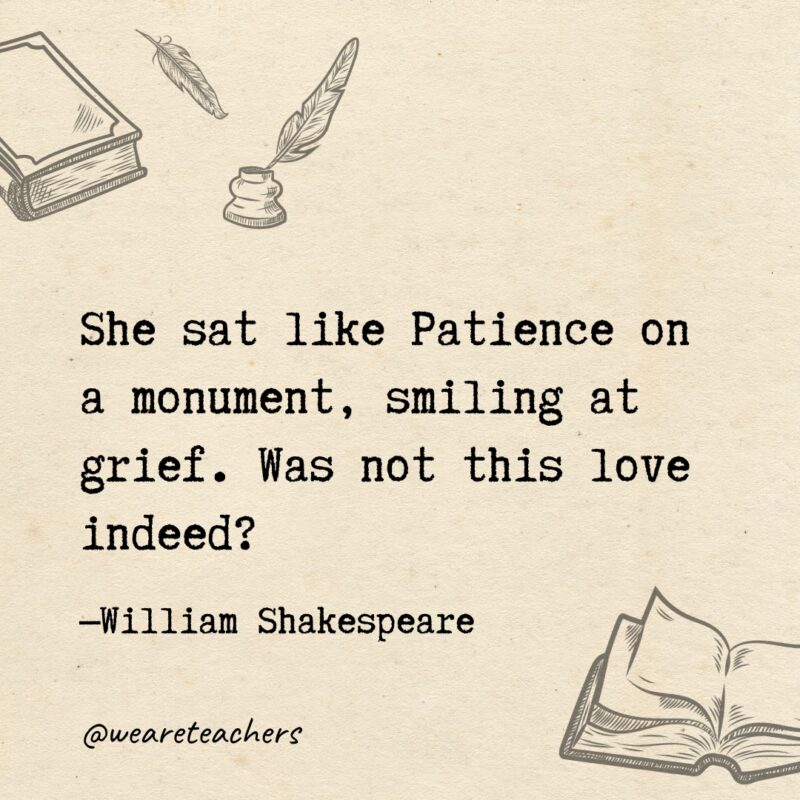
Doubt thou the stars are fire, doubt that the sun doth move. Doubt truth to be a liar, but never doubt I love. —Hamlet – Act 2, scene 2, lines 124-127.
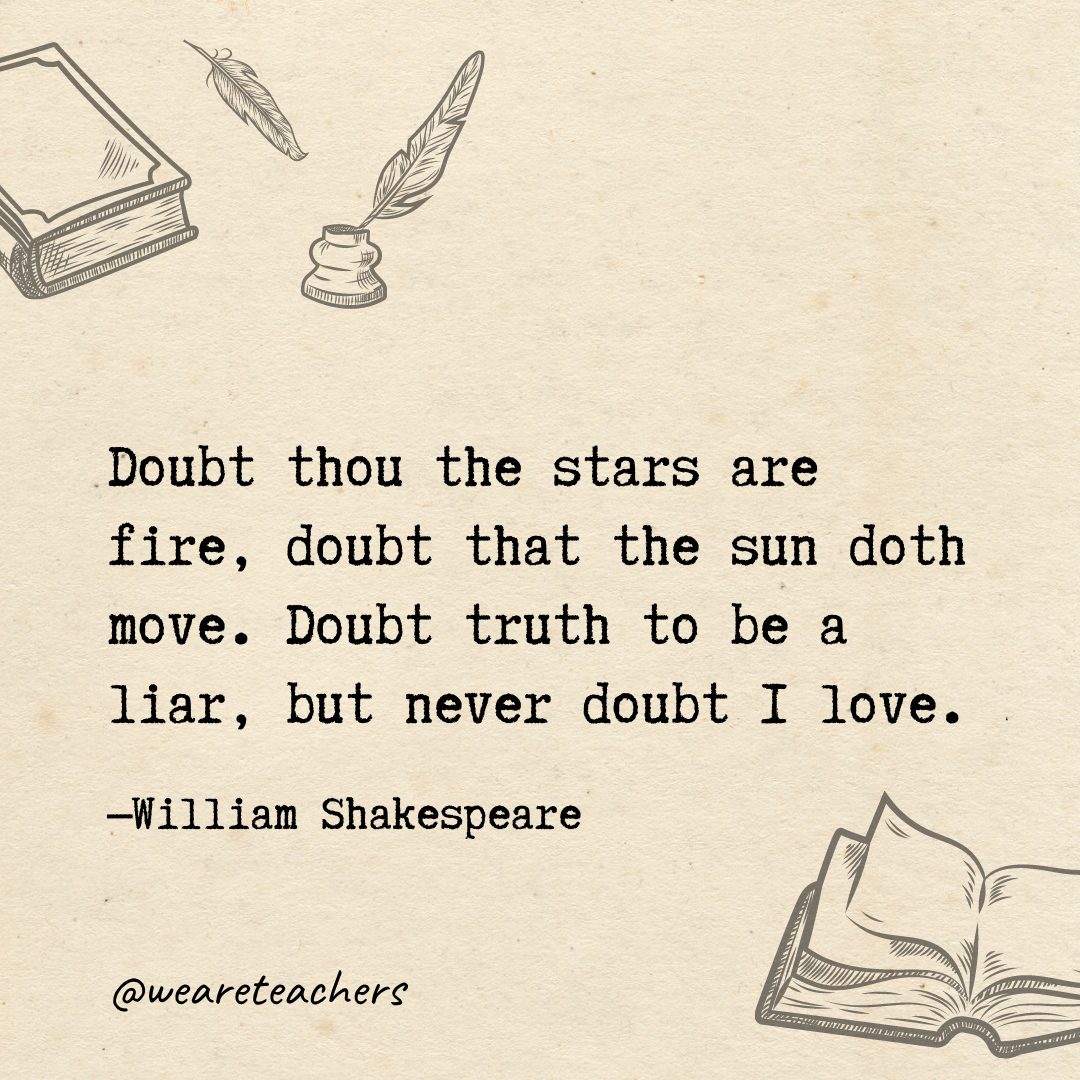
I love you with so much of my heart that none is left to protest. —Much Ado About Nothing – Act 4, scene 1, lines 300-301.

O, swear not by the moon, th’ inconstant moon, that monthly changes in her circled orb, lest that thy love prove likewise variable. —Romeo and Juliet – Act 2, scene 2, lines 114-116.
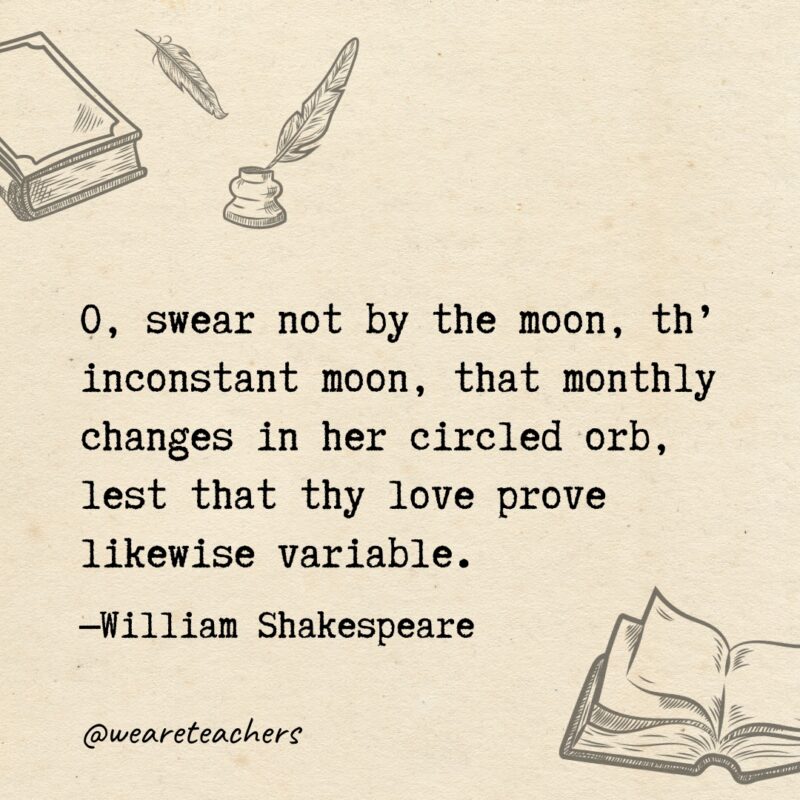
Speak of me as I am … Of one that loved not wisely, but too well. —Othello – Act 5, scene 2, lines 402-404.

My bounty is as boundless as the sea, my love as deep; the more I give to thee, the more I have, for both are infinite. —Romeo and Juliet – Act 2, scene 2, lines 140-142.
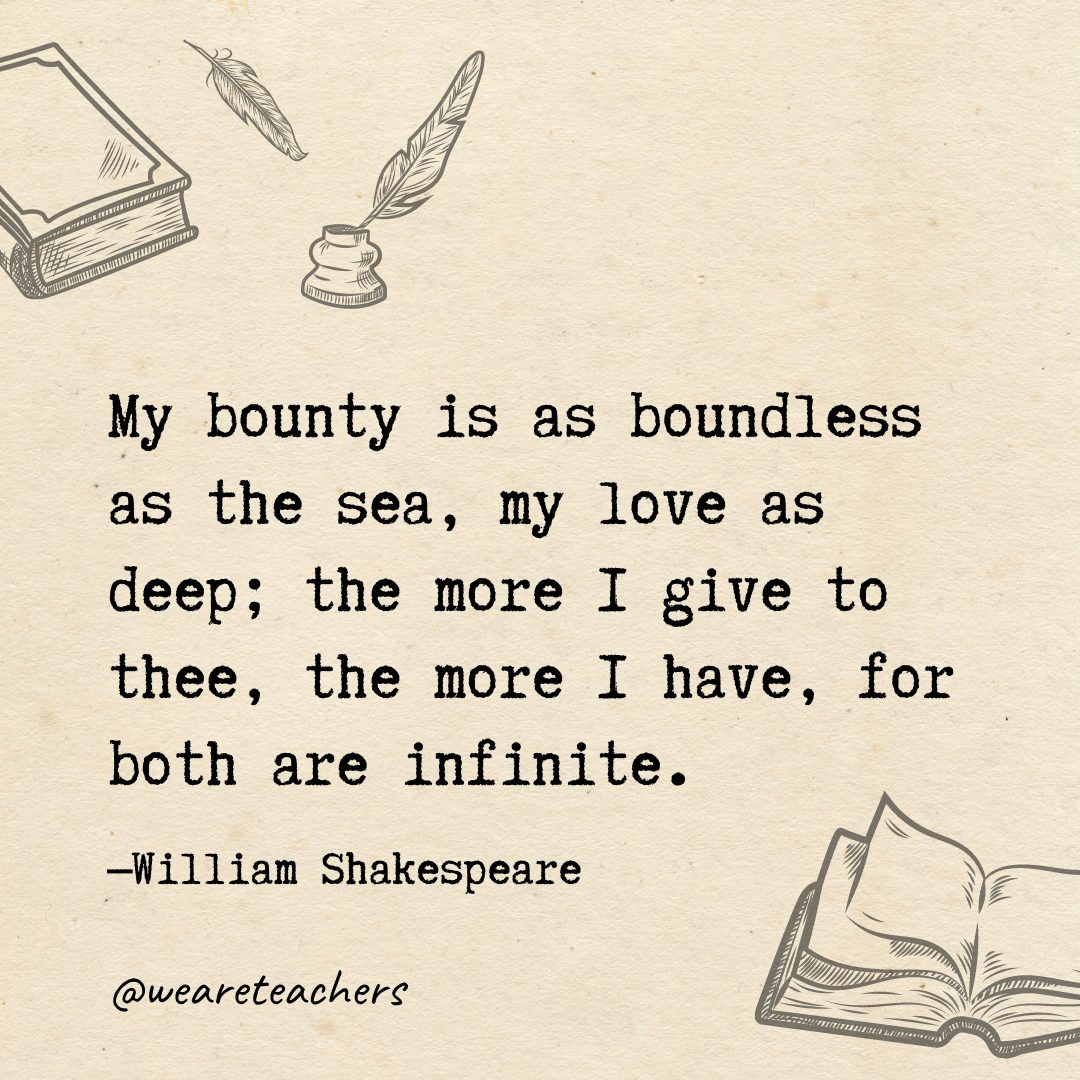
Shall I compare thee to a summer’s day? Thou art more lovely and more temperate. —Sonnet 18, line 1.

Love is too young to know what conscience is. —Sonnet 151, line 1.

If music be the food of love, play on. —Twelfth Night – Act 1, scene 1, line 1.

Love all, trust a few, do wrong to none. —All’s Well That Ends Well – Act 1, scene 1, lines 66-67.

Did my heart love till now? Forswear it, sight! For I ne’er saw true beauty till this night. —Romeo and Juliet – Act 1, scene 5, lines 59-60.

Kindness in women, not their beauteous looks, shall win my love. —The Taming of the Shrew – Act 4, scene 2, lines 41-42.

Love is a smoke made with the fume of sighs. —Romeo and Juliet – Act 1, scene 1, line 197.

Love looks not with the eyes but with the mind, and therefore is winged Cupid painted blind. —A Midsummer Night’s Dream – Act 1, scene 1, lines 240-241.

And yet, to say the truth, reason and love keep little company together nowadays. —A Midsummer Night’s Dream – Act 3, scene 1, lines 145-146.

See how she leans her cheek upon her hand. O, that I were a glove upon that hand that I might touch that cheek! —Romeo and Juliet – Act 2, scene 2, lines 24-26.

Go to your bosom: Knock there, and ask your heart what it doth know. —Measure for Measure – Act 2, scene 2, lines 166-167.

The course of true love never did run smooth. —A Midsummer Night’s Dream – Act 1, scene 1, line 136.

In black ink my love may still shine bright. —Sonnet 65, line 14.
For which of my bad parts didst thou first fall in love with me? —Much Ado About Nothing – Act 5, scene 2, lines 59-61.

Love alters not with his brief hours and weeks, but bears it out even to the edge of doom. —Sonnet 116, lines 11-12.

Speak low, if you speak love. —Much Ado About Nothing – Act 2, scene 1, line 97.

Love sought is good, but given unsought is better. —Twelfth Night – Act 3, scene 1, line 164.

Good night, good night! Parting is such sweet sorrow, that I shall say good night till it be morrow. —Romeo and Juliet – Act 2, scene 2, lines 199–201.

So long as men can breathe or eyes can see, so long lives this and this gives life to thee. —Sonnet 18, line 13.

Love comforteth like sunshine after rain. —Venus and Adonis, line 799.

How art thou out of breath when thou hast breath to say to me that thou art out of breath? —Romeo and Juliet – Act 2, scene 5, lines 33-34.

For you, in my respect, are all the world. —A Midsummer Night’s Dream – Act 2, scene 1, line 231.

Love is not love, which alters when it alteration finds. —Sonnet 116, lines 2-3.
I had rather hear my dog bark at a crow than a man swear he loves me. —Much Ado About Nothing – Act 1, scene 1, lines 129-130.

Love is merely a madness. —As You Like It – Act 3, scene 2, line 407.

“I see, lady, the gentleman is not in your books.” “No. An he were, I would burn my study.” —Much Ado About Nothing – Act 1, scene 1, lines 76-78.

I would my horse had the speed of your tongue. —Much Ado About Nothing – Act 1, scene 1, lines 139-140.
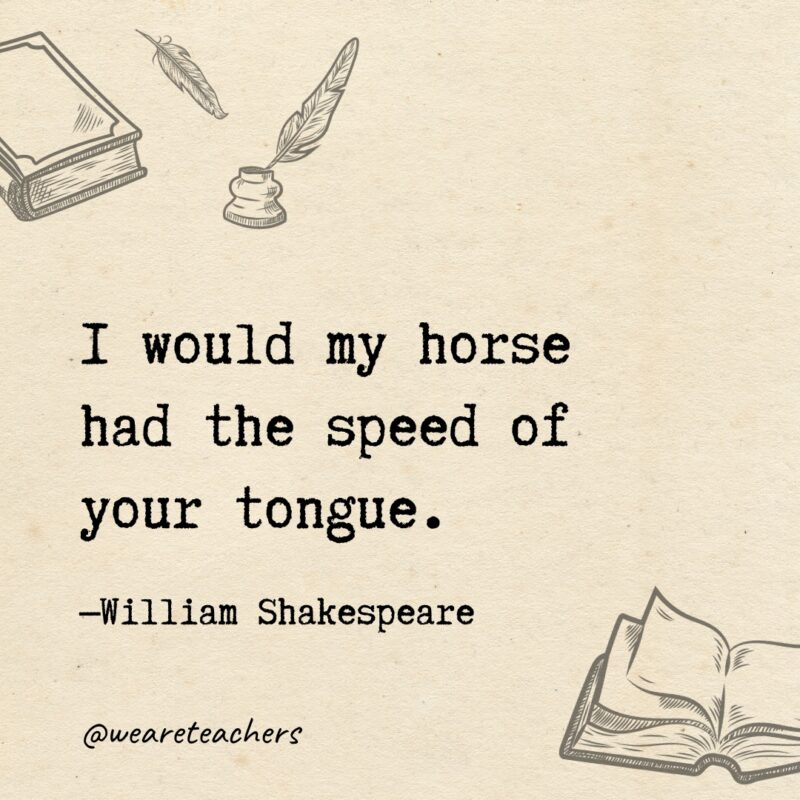
God hath given you one face, and you make yourselves another. —Hamlet – Act 3, scene 1, lines 155-156.

Misery acquaints a man with strange bedfellows. —The Tempest – Act 2, scene 2, lines 40-41.

O thou invisible spirit of wine, if thou hast no name to be known by, let us call thee devil. —Othello – Act 2, scene 3, lines 300-302.
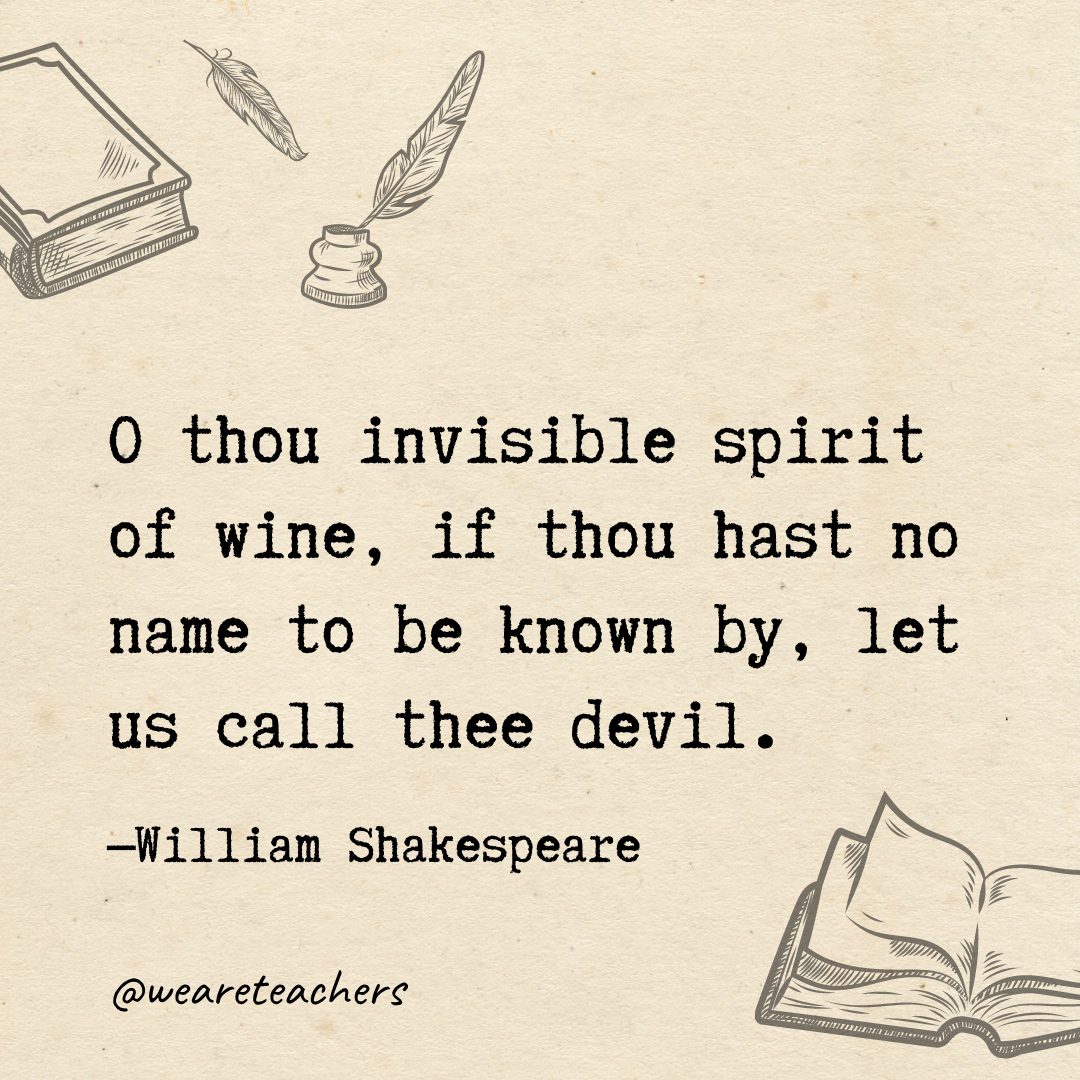
He that loves to be flattered is worthy o’ th’ flatterer. —Timon of Athens – Act 1, scene 1, lines 258-259.

Lord, what fools these mortals be! —A Midsummer Night’s Dream – Act 3, scene 2, line 117.
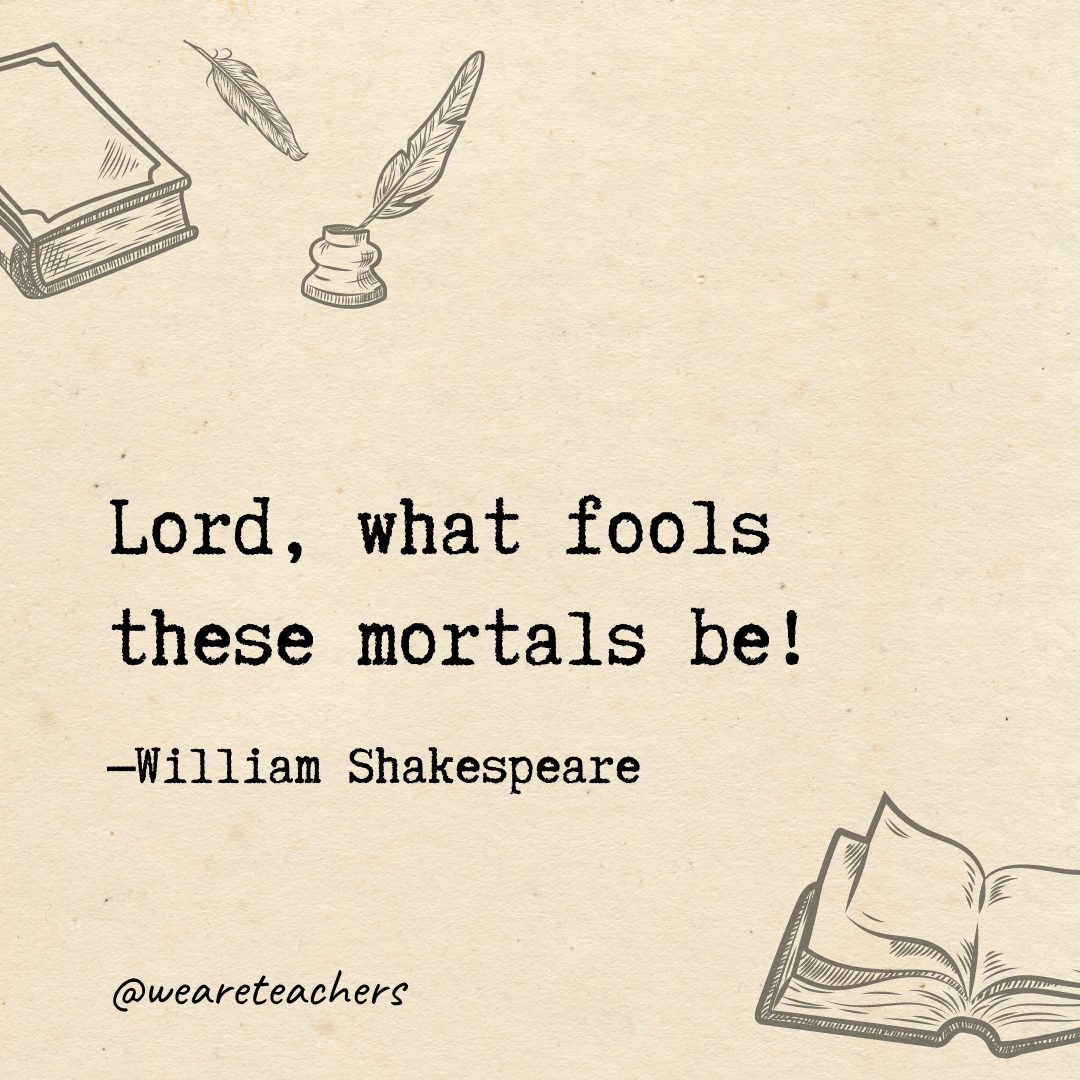
Life is as tedious as a twice-told tale, vexing the dull ear of a drowsy man. —King John – Act 3, scene 4, lines 110-111.
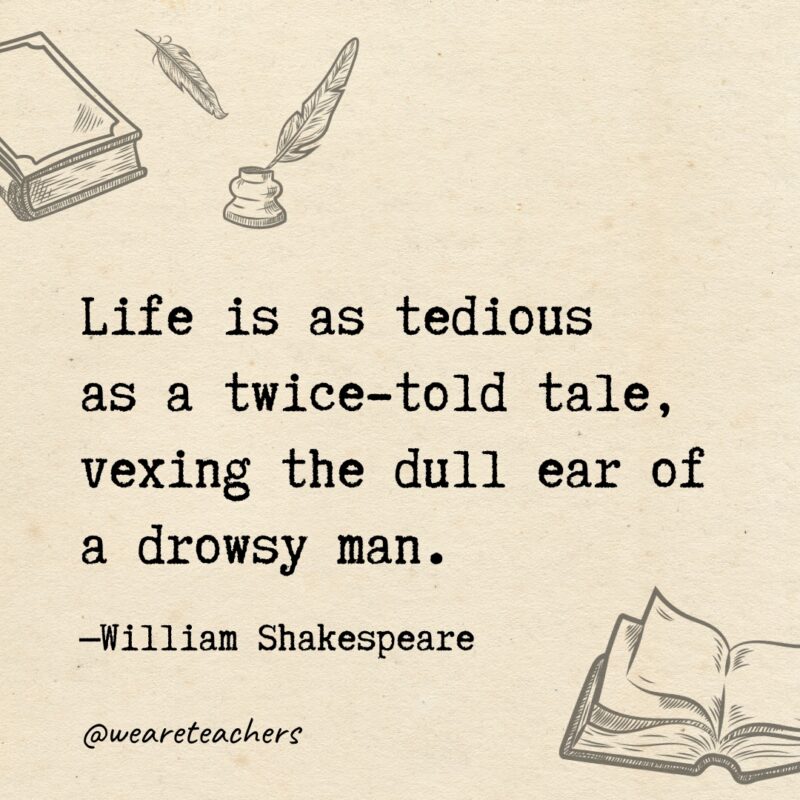
I will praise any man that will praise me. —Antony and Cleopatra – Act 2, scene 6, line 115.

Better a witty fool than a foolish wit. —Twelfth Night – Act 1, scene 5, line 34.

My pride fell with my fortunes. —As You Like It – Act 1, scene 2, line 252.

Cowards die many times before their deaths; the valiant never taste of death but once. —Julius Caesar – Act 2, scene 2, lines 34-35.
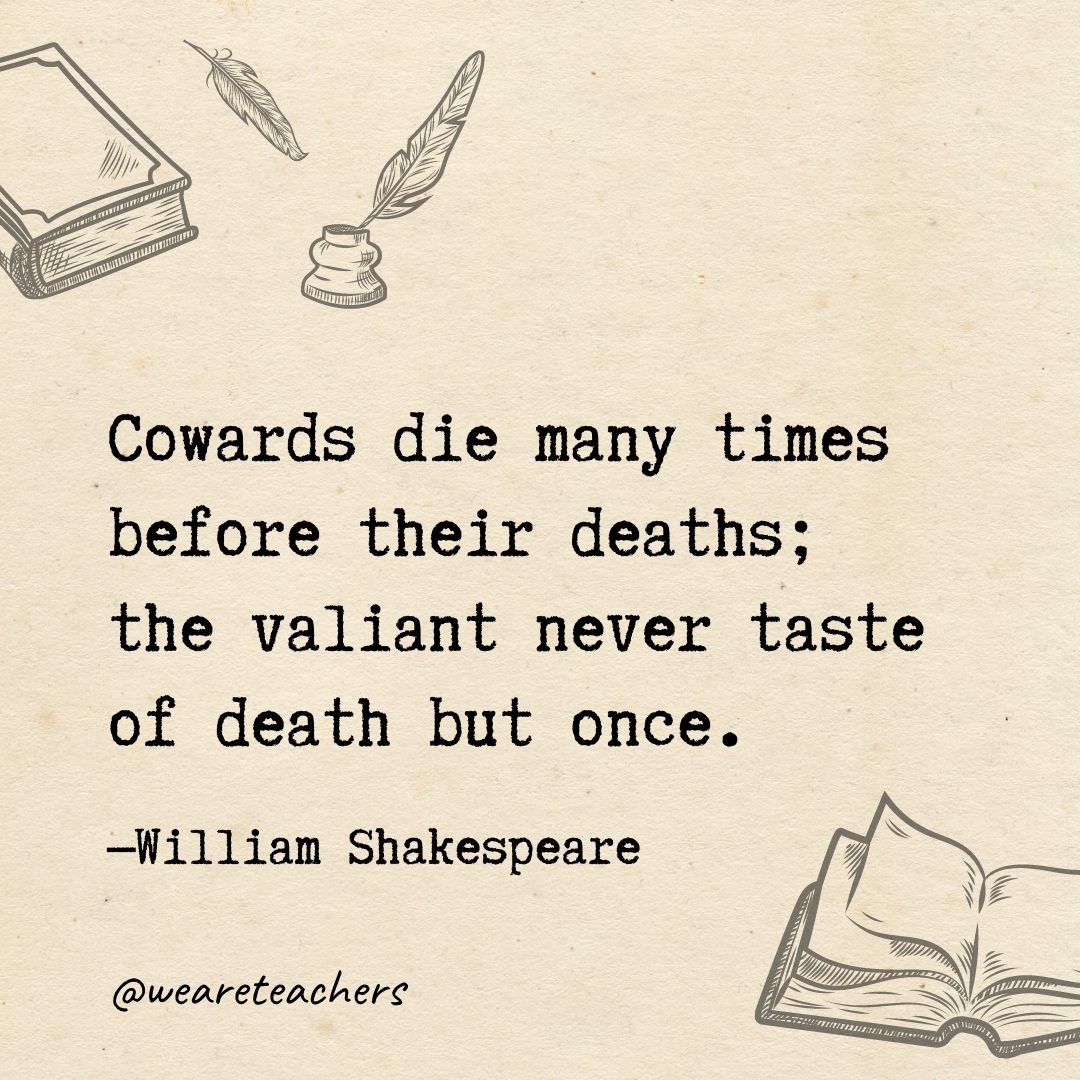
There’s many a man hath more hair than wit. —The Comedy of Errors – Act 2, scene 2, lines 90-91.

Is it not strange that desire should so many years outlive performance? —Henry IV – Part 2, Act 2, scene 4, lines 265-266.
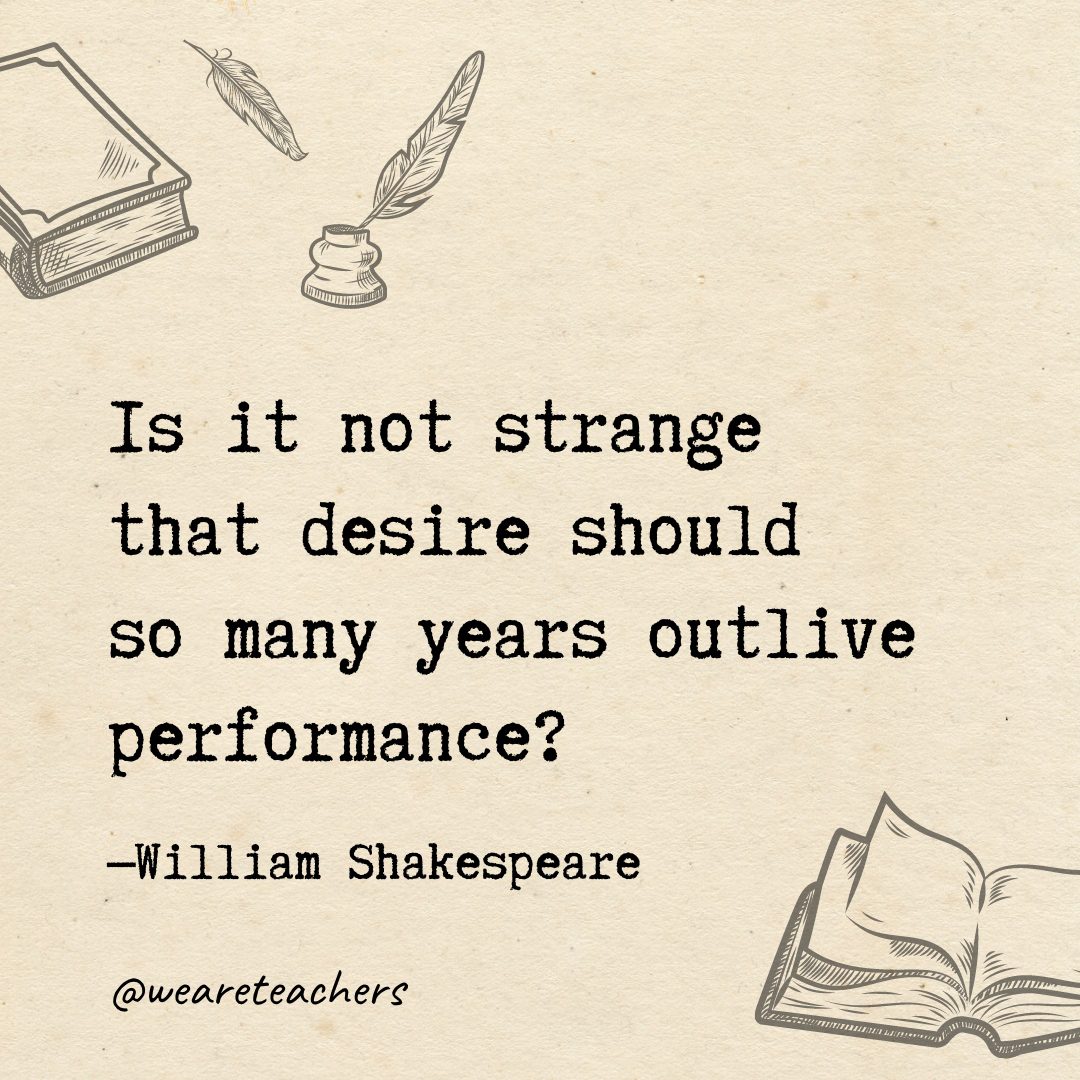
I dote on his very absence. —The Merchant of Venice – Act 1, scene 2, line 110.
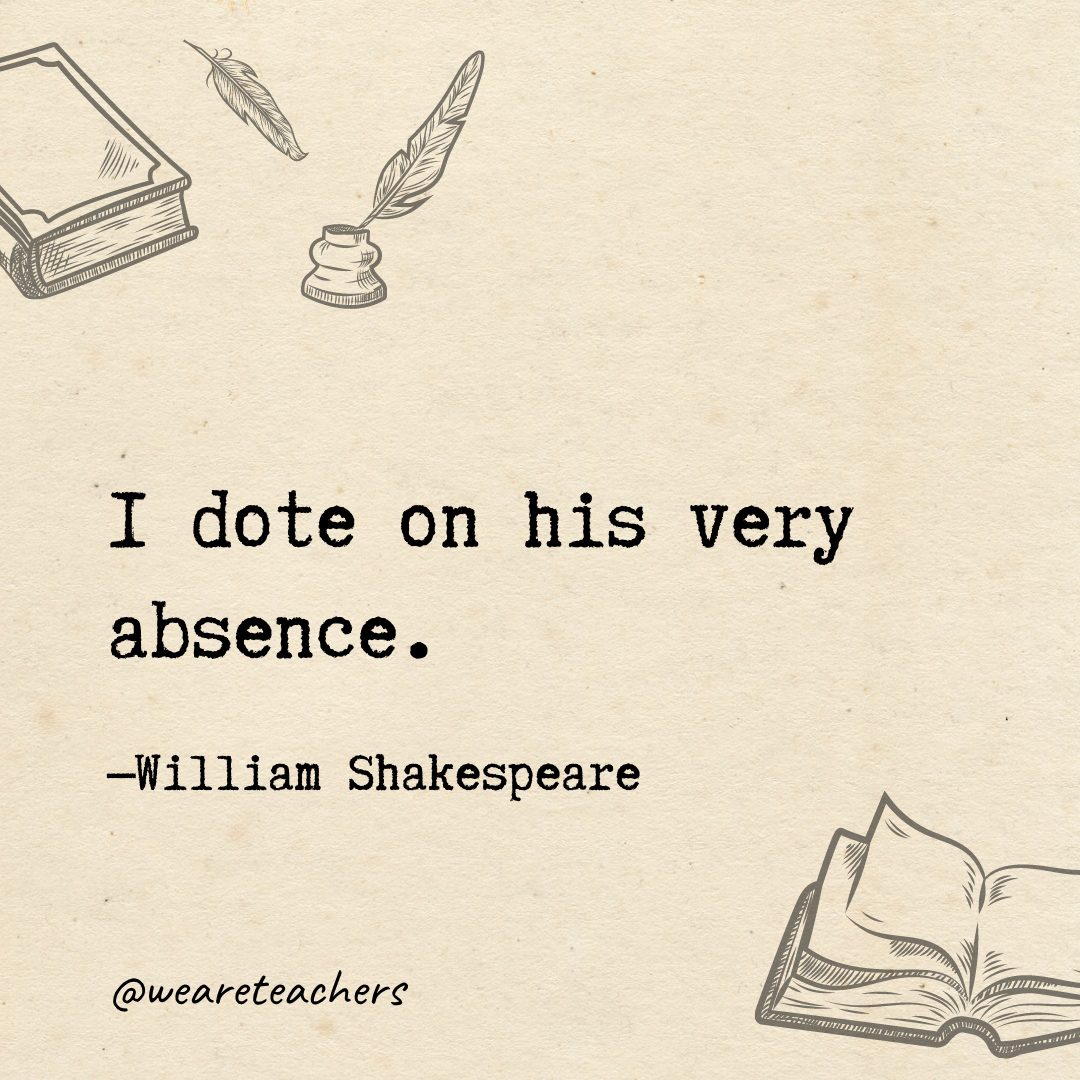
I am not bound to please thee with my answers. —The Merchant of Venice – Act 4, scene 1, line 66.
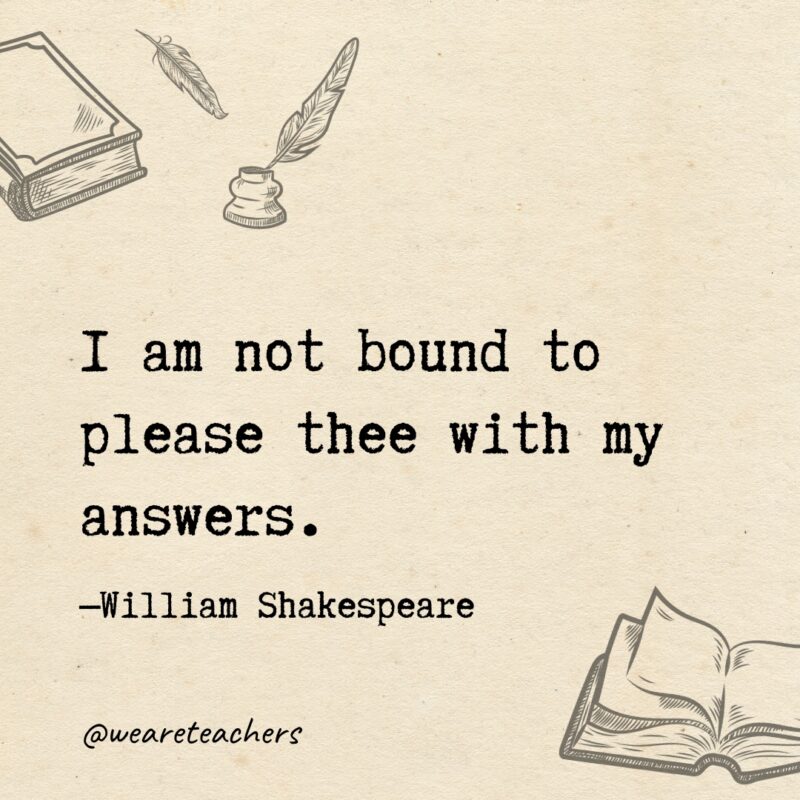
The fool doth think he is wise, but the wise man knows himself to be a fool. —As You Like It – Act 5, scene 1, lines 31-32.

Reputation is an idle and most false imposition; oft got without merit, and lost without deserving. —Othello – Act 2, scene 3, lines 287-289.
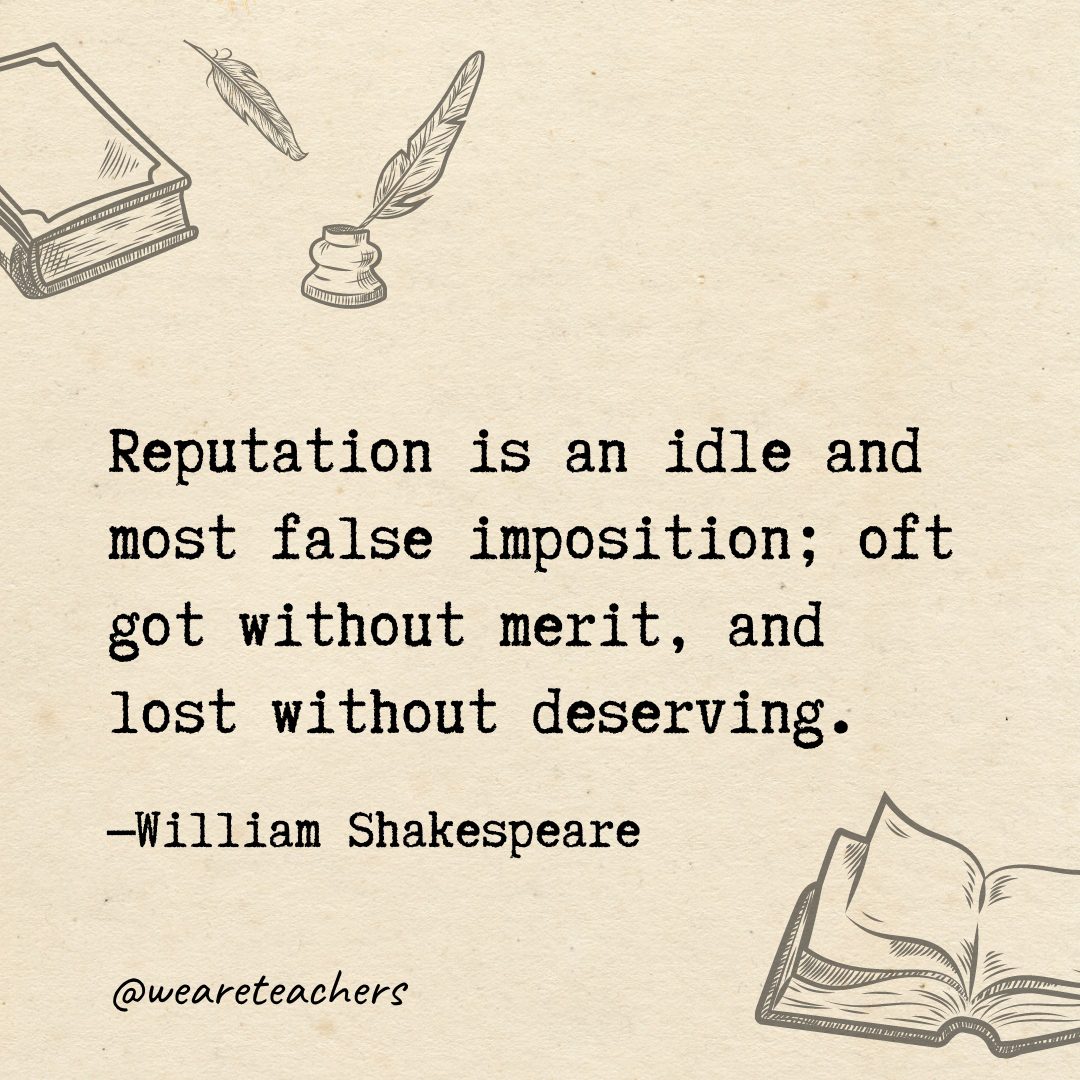
A lover’s eyes will gaze an eagle blind. —Love’s Labor’s Lost – Act 4, scene 3, line 328.

Be wary, then; best safety lies in fear. —Hamlet – Act 1, scene 3, line 47.

I count myself in nothing else so happy as in a soul rememb’ring my good friends. —Richard II – Act 2, scene 3, lines 48-49.

The private wound is deepest. —The Two Gentlemen of Verona – Act 5, scene 4, line 75.

Thy sting is not so sharp as friend remembered not. —As You Like It – Act 2, scene 7, lines 196-197.
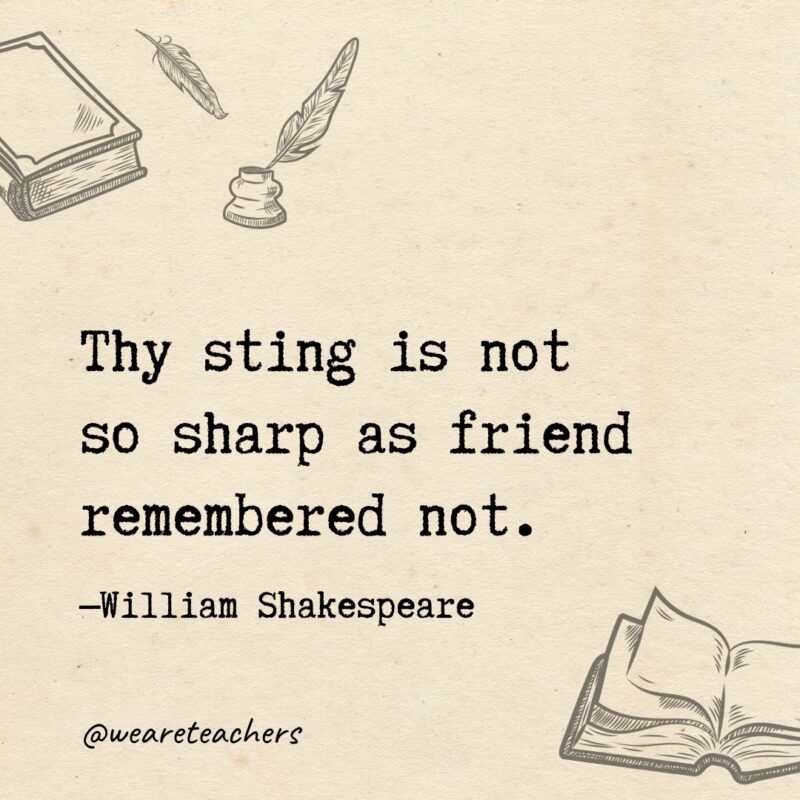
Friendship is constant in all other things, save in the office and affairs of love. —Much Ado About Nothing – Act 2, scene 1, lines 173-174.
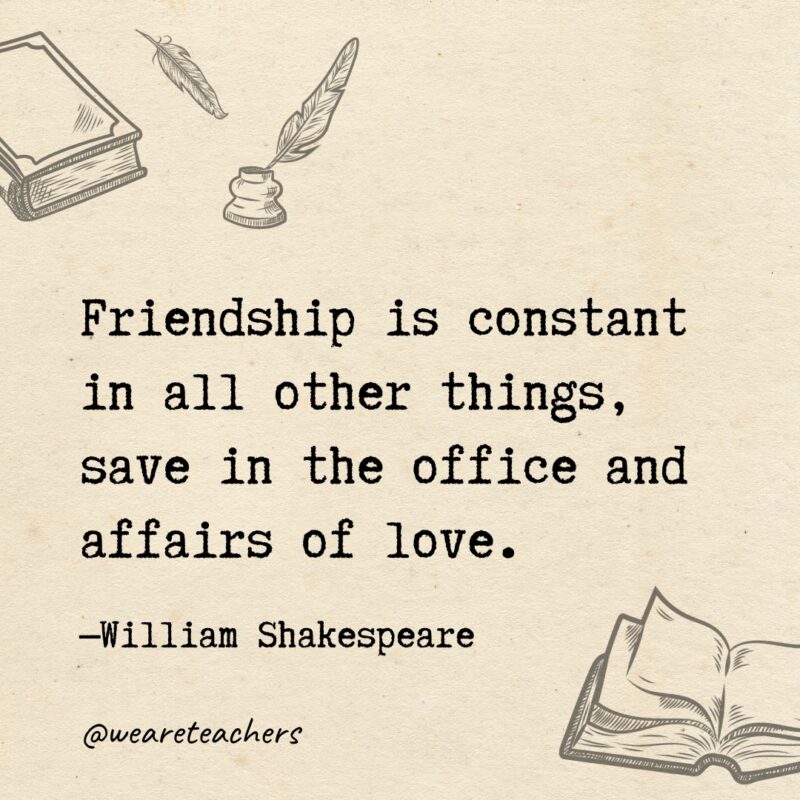
Of all base passions, fear is most accursed. —Henry VI – Part 1, Act 5, scene 2, line 18.

There’s beggary in the love that can be reckoned. —Antony and Cleopatra – Act 1, scene 1, line 16.

I do love nothing in the world so well as you. Is not that strange? —Much Ado About Nothing – Act 4, scene 1, lines 281-282.

A heaven on earth I have won by wooing thee. —All’s Well That Ends Well – Act 4, scene 2, line 78.

By my troth, I kiss thee with a most constant heart. —Henry IV – Part 2, Act 2, scene 4, lines 274-275.
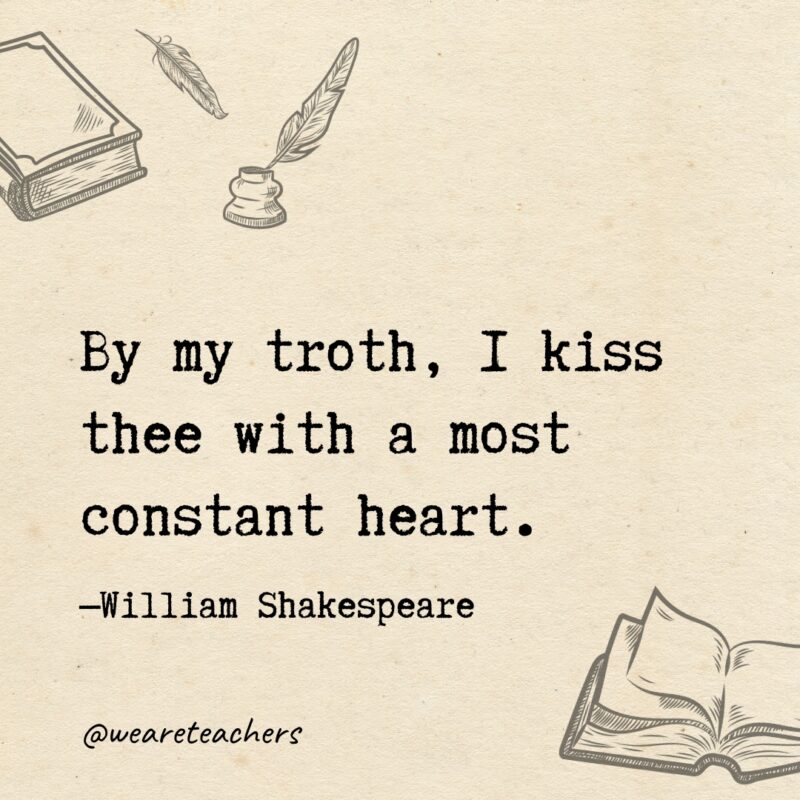
O horror, horror, horror! Tongue nor heart cannot conceive nor name thee! —Macbeth, Act 2, scene 3, lines 73-74.

So are you to my thoughts as food to life, or as sweet-seasoned showers are to the ground. —Sonnet 75, lines 1-2.
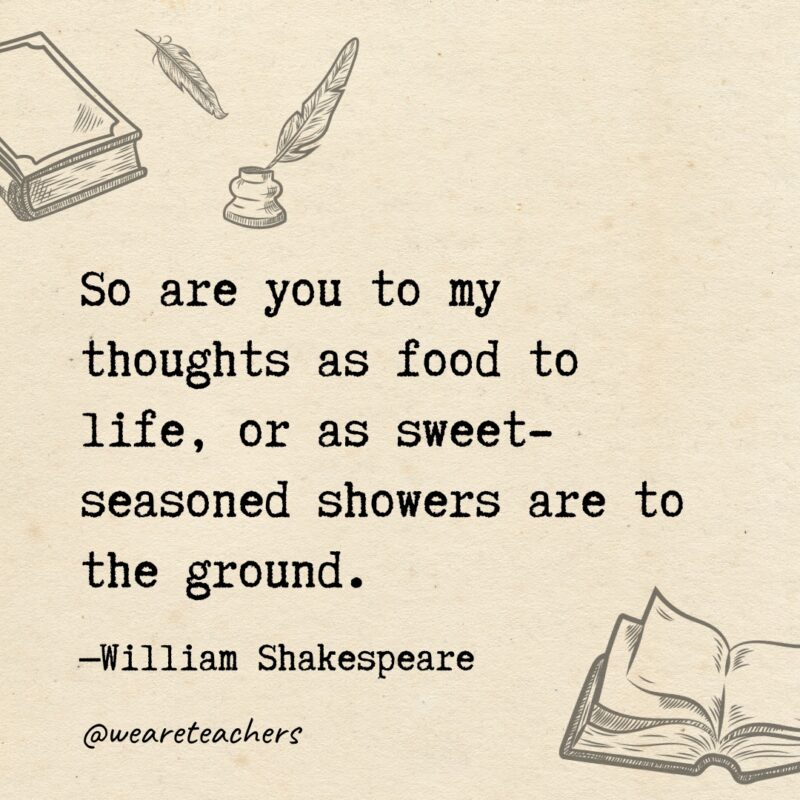
Thee will I love, and with thee lead my life. —The Comedy of Errors – Act 3, scene 2, line 72.

When you depart from me, sorrow abides and happiness takes his leave. —Much Ado About Nothing – Act 1, scene 1, lines 99-100.
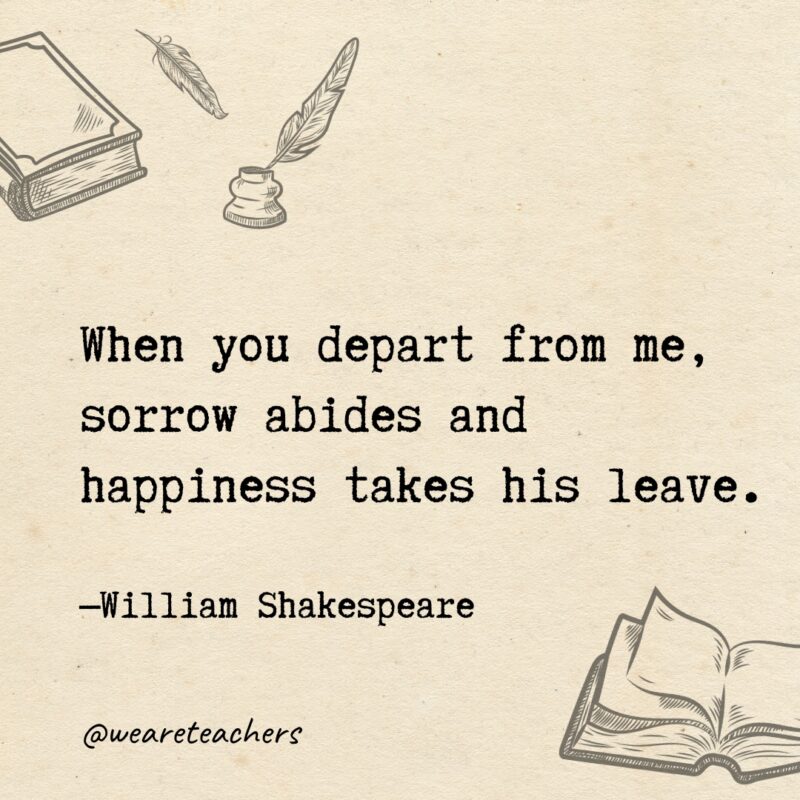
O God, I could be bounded in a nutshell and count myself a king of infinite space, were it not that I have bad dreams. —Hamlet – Act 2, scene 2, lines 273-275.

To mingle friendship far is mingling bloods. —The Winter’s Tale – Act 1, scene 2, line 140.
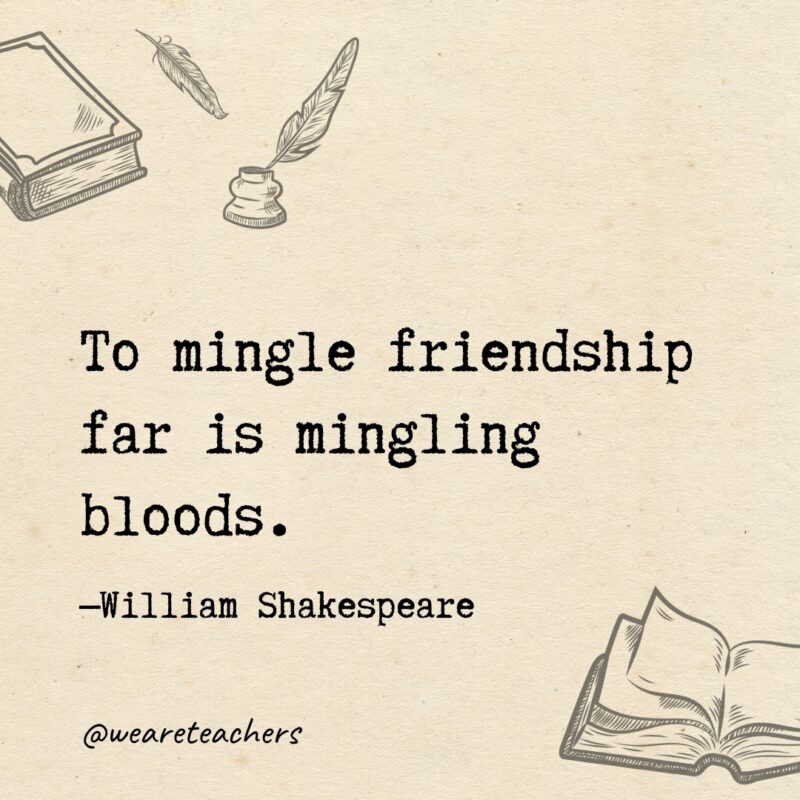
This above all: To thine own self be true. —Hamlet – Act 1, scene 3, line 84.
